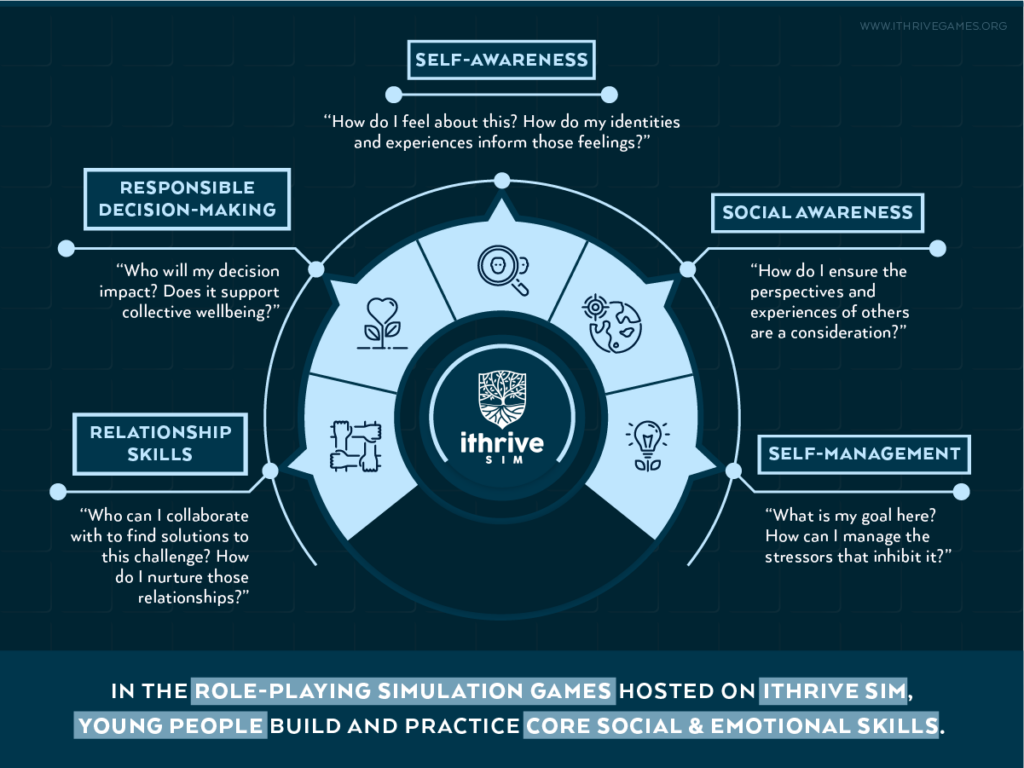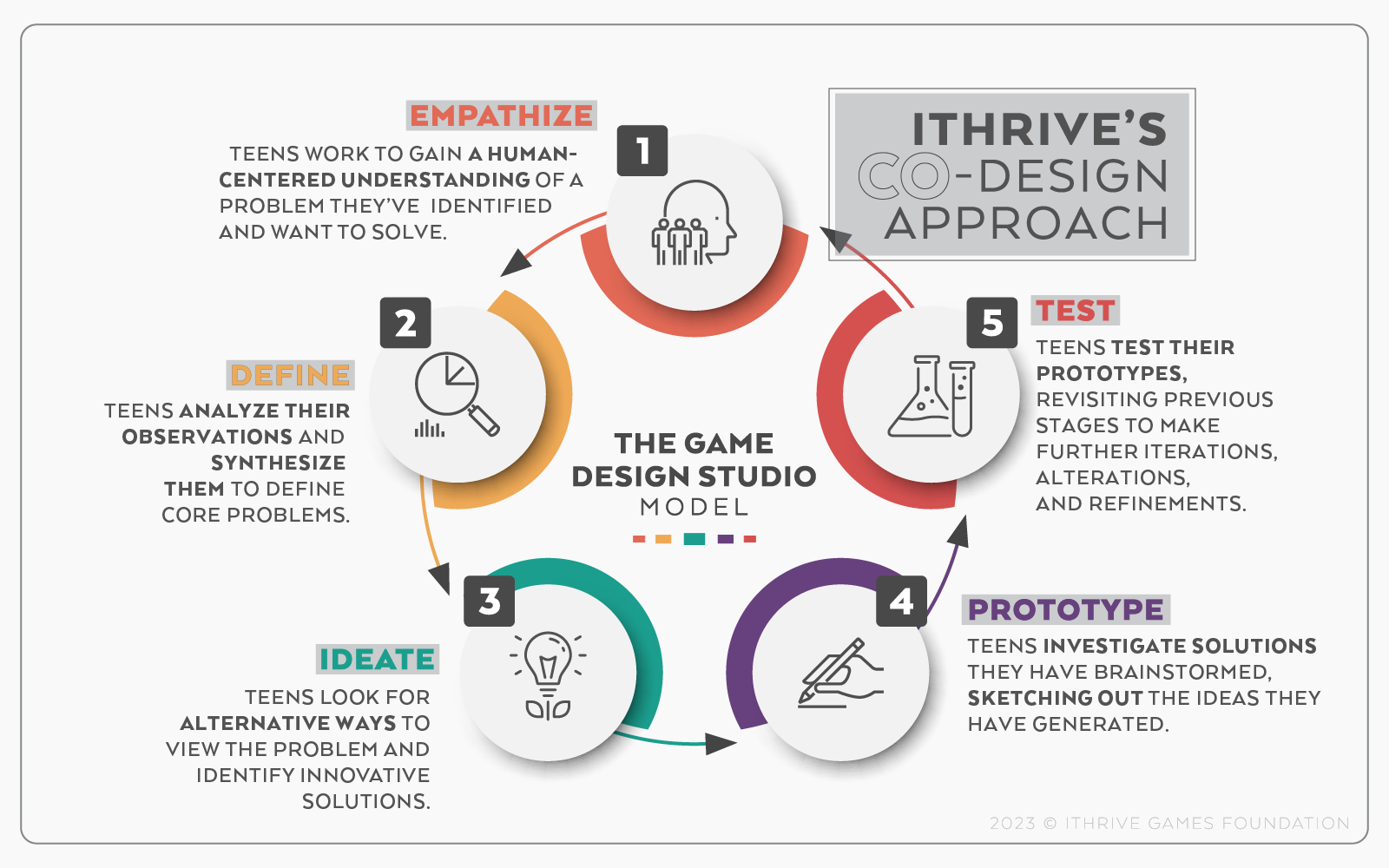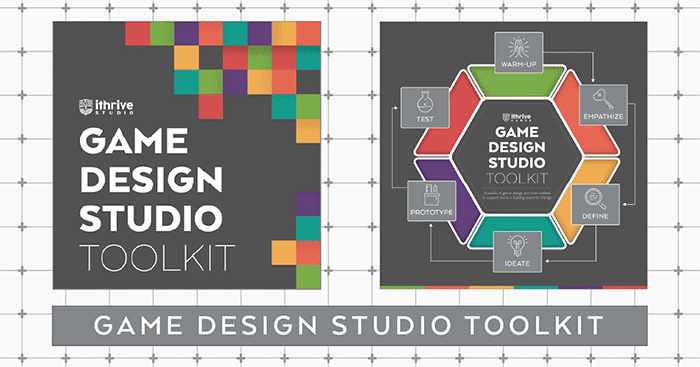Teen Co-Design is Teen Learning: The Story of The Porcelain Child
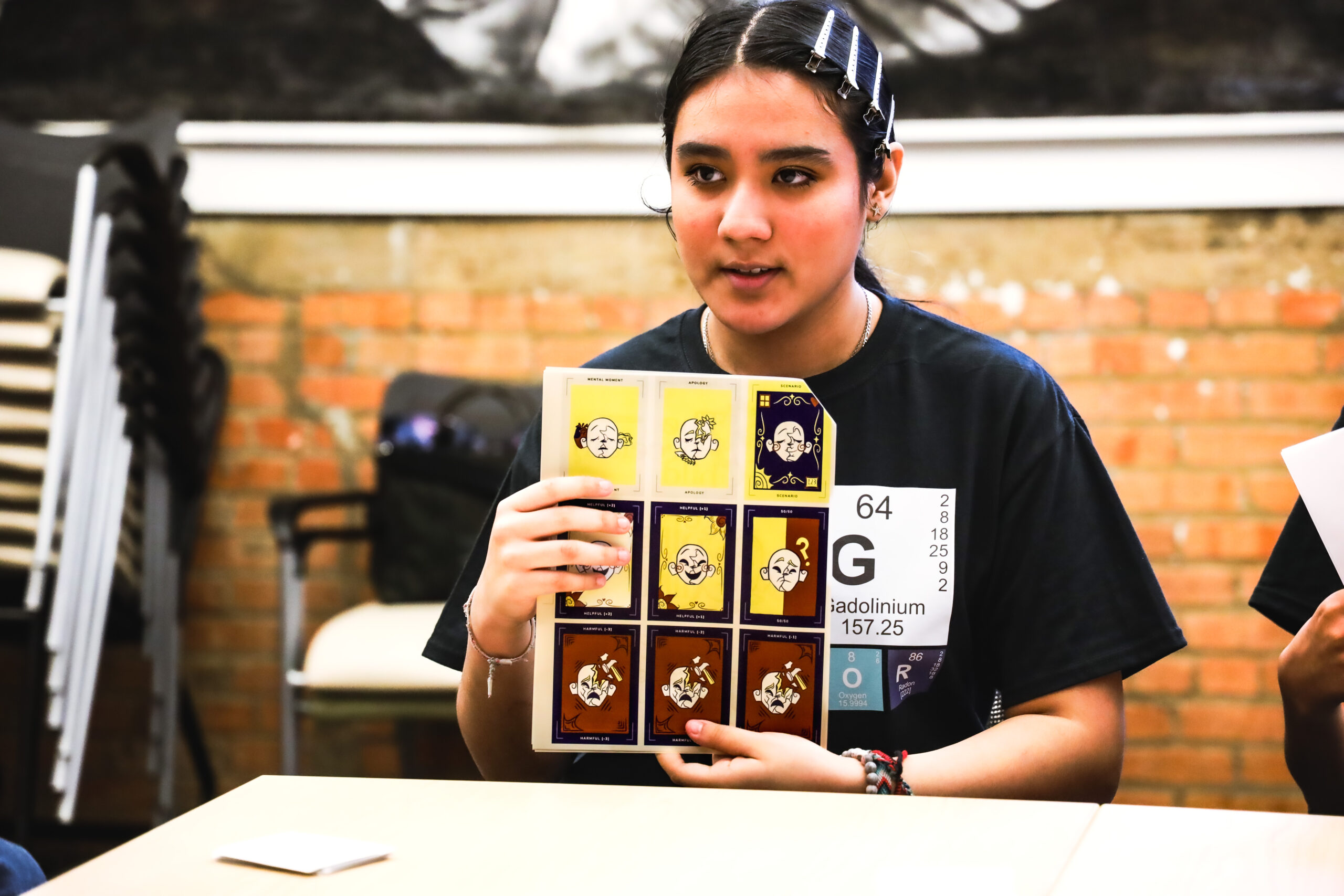
What happens when teens are invited not just to play—but to design, decide, and disrupt?
In a workshop room in Dallas, Texas, a group of teenagers gathered around a table and began to share their wishes for how they wanted adults to show up for them. One talked about the way their teacher dismissed them. Another reflected on the echo of a parent's words. "It's like being made of porcelain," one teen said. "Every time it happens, you crack a little." Together they asked, what if adults knew how much their words can hurt us?
From that conversation, a game was born to help adults learn. It was called The Porcelain Child—and like the teens who made it, it doesn't flinch from the truth.
A GAME DESIGNED TO BE HEARD
The Porcelain Child is a teen-designed tabletop game about the impact of adult words and actions on young people. Through collaborative gameplay, players consider scenarios, choose reactions, and see—in real time—how words can hurt or heal. It's a mirror, a conversation starter, and a call to action.
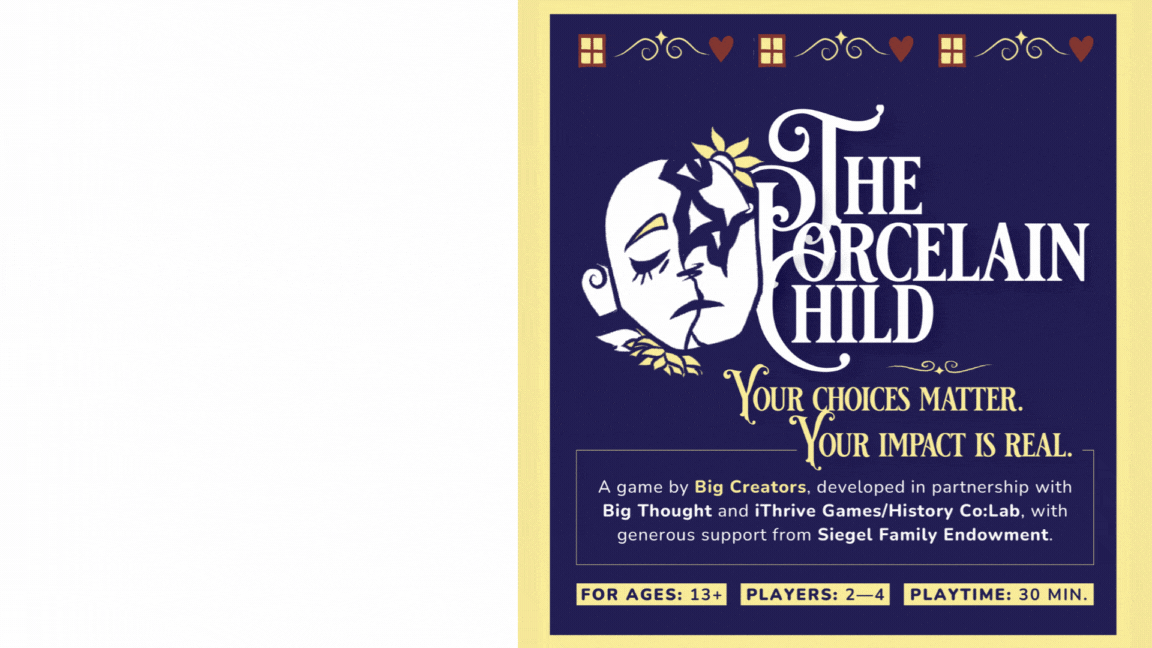

Pictured are the teen-designed game materials from the tabletop game The Porcelain Child, including the body board (left) and card options (right).
Created by 25 teen designers in a Game Design Studio (GDS) co-hosted by iThrive Games at the History Co:Lab—in partnership with Big Thought and Fit and Faithful Living, and with generous support from the Siegel Family Endowment—The Porcelain Child was designed entirely by youth. From early brainstorms to the final prototype, the teens—who later named themselves Big Creators—led every step of the process.
What emerged was not just a game, but a powerful learning experience supportive of collaborative growth and the social-emotional skills needed to thrive as contributions in a connected world. "I usually do everything solo," one Big Creator shared. "But this made me realize how powerful it is to create with other people—and be heard."
LEARNING IN LAYERS
The Game Design Studio model is more than a method for making games—it's a process for making meaning. Rooted in learning science, adolescent development as well as systems and design thinking, Game Design Studio supports youth in analyzing real-world challenges, envisioning change, and expressing their truth through game design.
"Co-design in the Game Design Studio experience is about teens learning and playing together," shared Susan Rivers, Chief Scientist at iThrive Games, co-lead at the History Co:Lab and co-architect of the Game Design Studio model. "They learn best as they make something meaningful together. Through the creative collaboration process, they build trust, grapple with understanding the systems surrounding them, and express themselves. The process invites teens to use their voice and their lived experiences to contribute to important conversations and imagine what's possible. The game is an artifact of their learning and an invitation for others to engage with them."
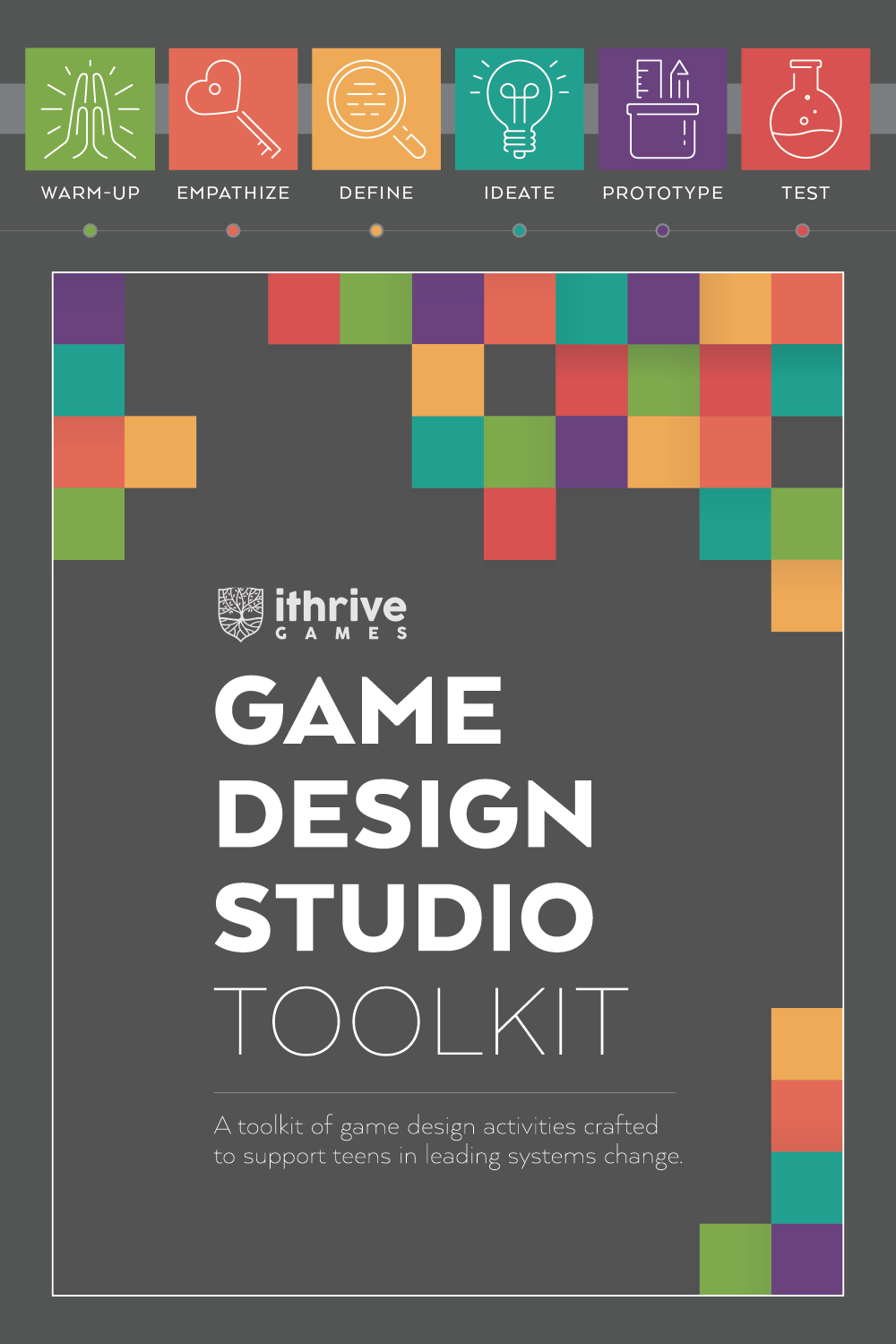
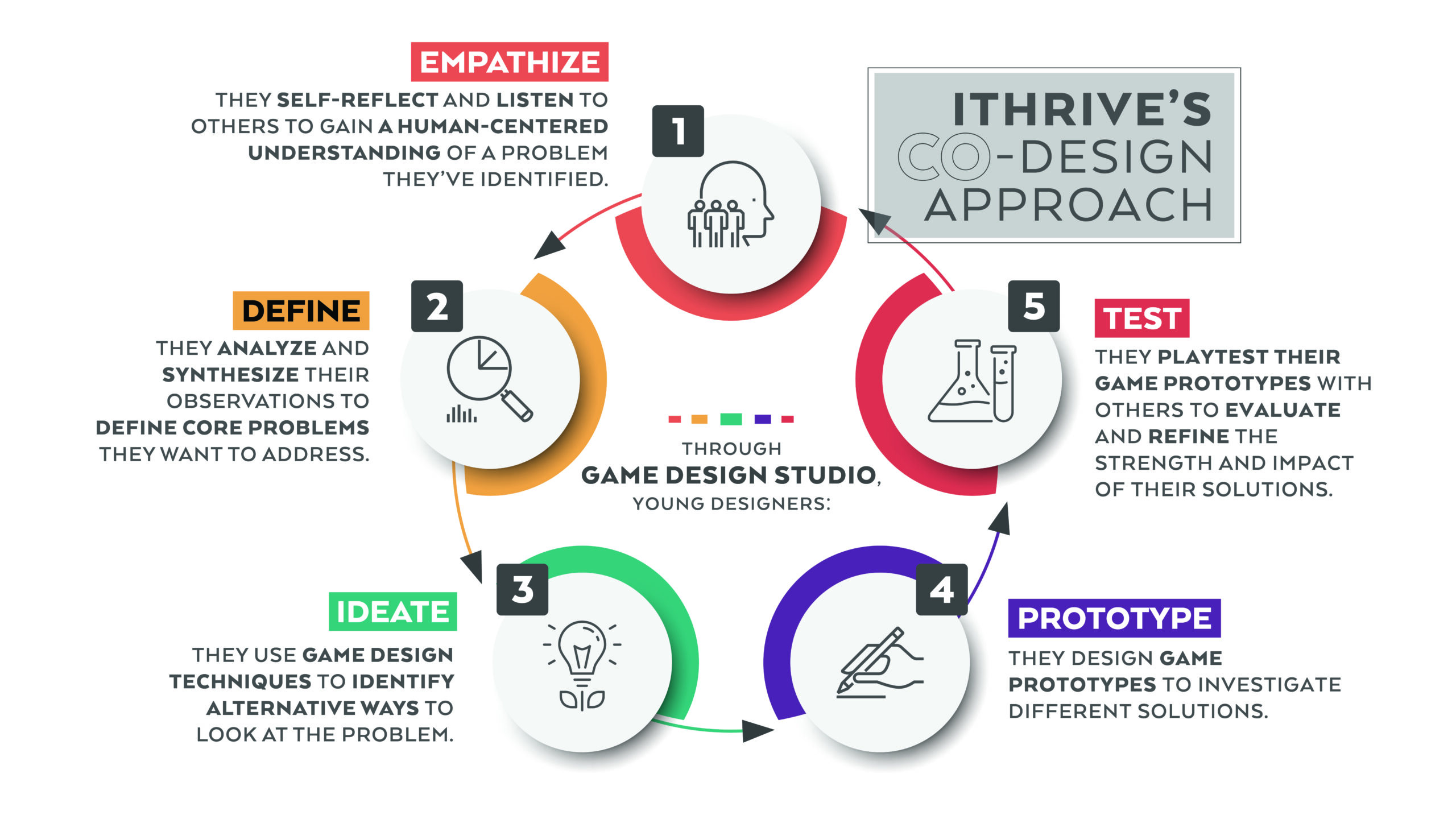
Game Design Studio (GDS) is a teen-led and teen-centered learning experience that invites youth to turn their lens and lived experience into games that spark dialogue, connection, and change. Download and explore the GDS toolkit.
Game Design Studio offers a different way to learn-one centered on teens and where they are developmentally.
"It just taught us how to communicate with each other and learn from each other," shared one Big Creator. "We all built off of each other to end up with this amazing game." Another added, "To be able to listen to other people's ideas and take it in and mix it together to get a final product—that's a big thing we are going to have to use."
RESONANCE BEYOND THE ROOM
In March 2025, the Big Creators debuted The Porcelain Child at SXSW EDU in Austin, Texas. Invited by the Siegel Family Endowment, the team of teen designers facilitated playtesting sessions and shared their stories with funders, educators, and attendees from across the country.
The feedback was personal and profound:
"This game made me realize I've got work to do," said Gregg Behr, Executive Director of The Grable Foundation. "It felt personal."
"The relationship between play and learning is incredibly strong," said Bo Stjerne Thomsen, Head of Impact at LEGO Education. "It provided an invitation to speak about issues in the family that are really difficult to uncover without play."
"It's a game I wish my parents had access to when I was a teen," shared Alicia Cagle, Youth Programming Manager at the World Affairs Council of Pittsburgh. "..It's a great tool to prompt valuable conversations."
"It's a powerful conversation starter," said Jason Swanson, Senior Director of Strategic Foresight at KnowledgeWorks.
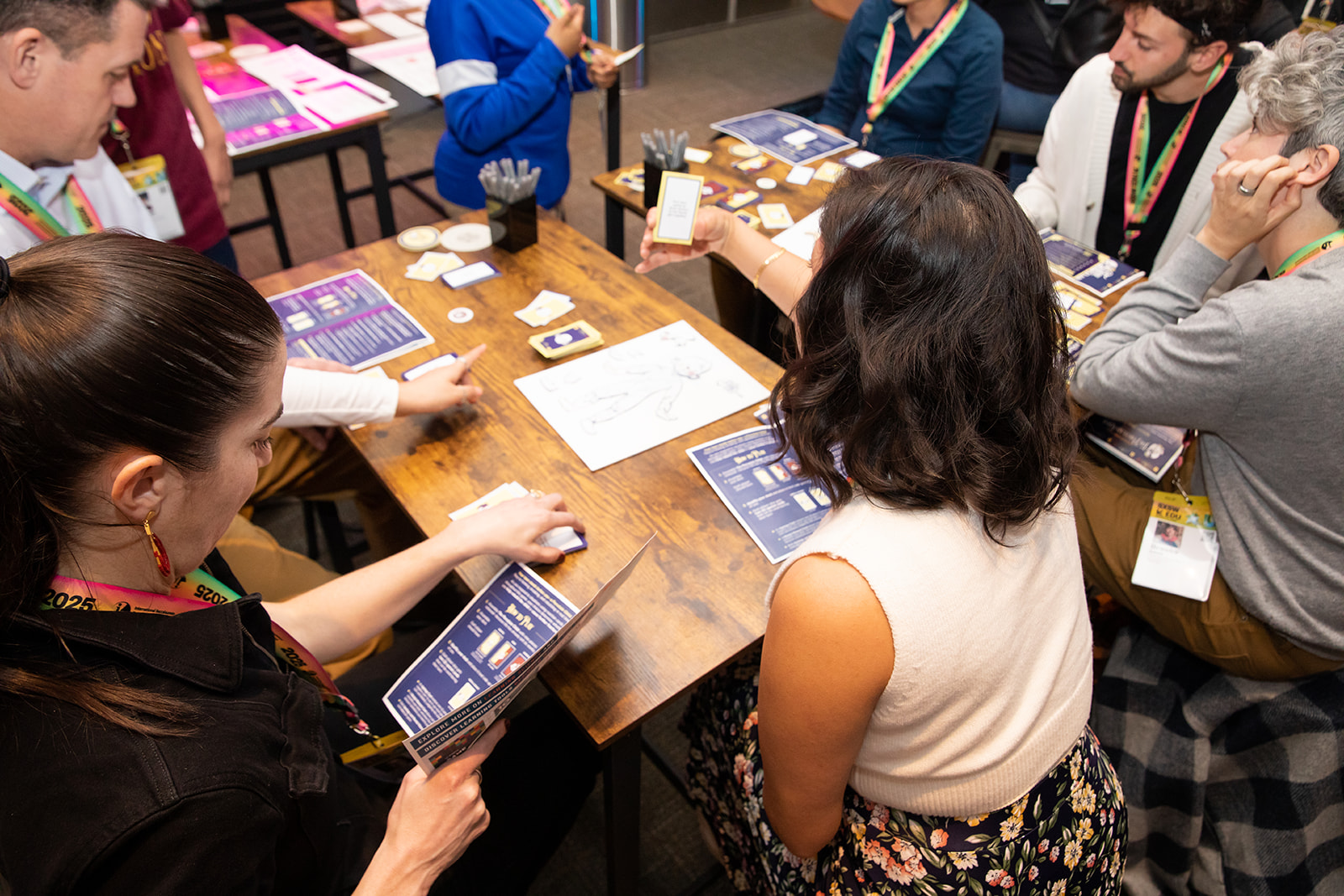
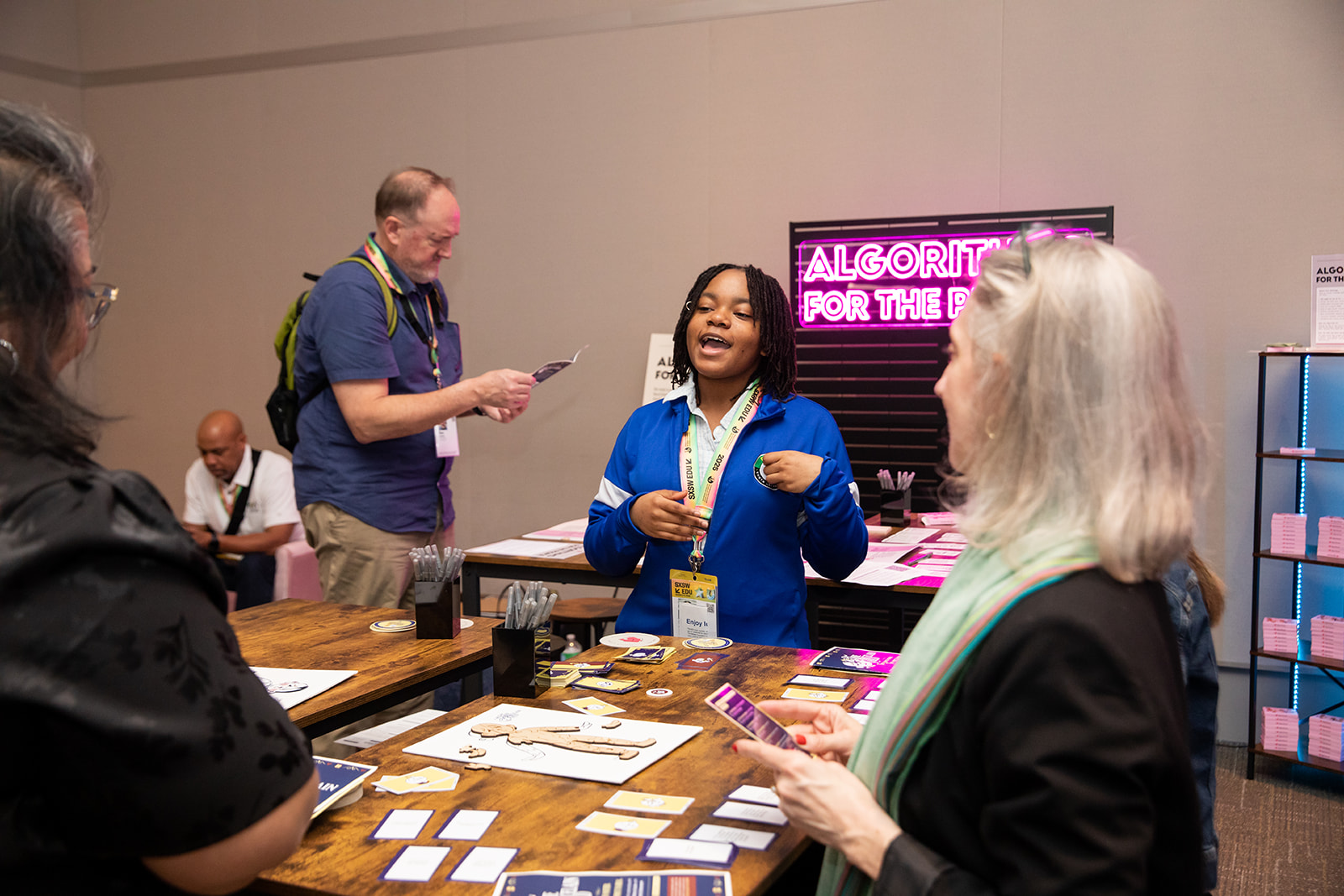
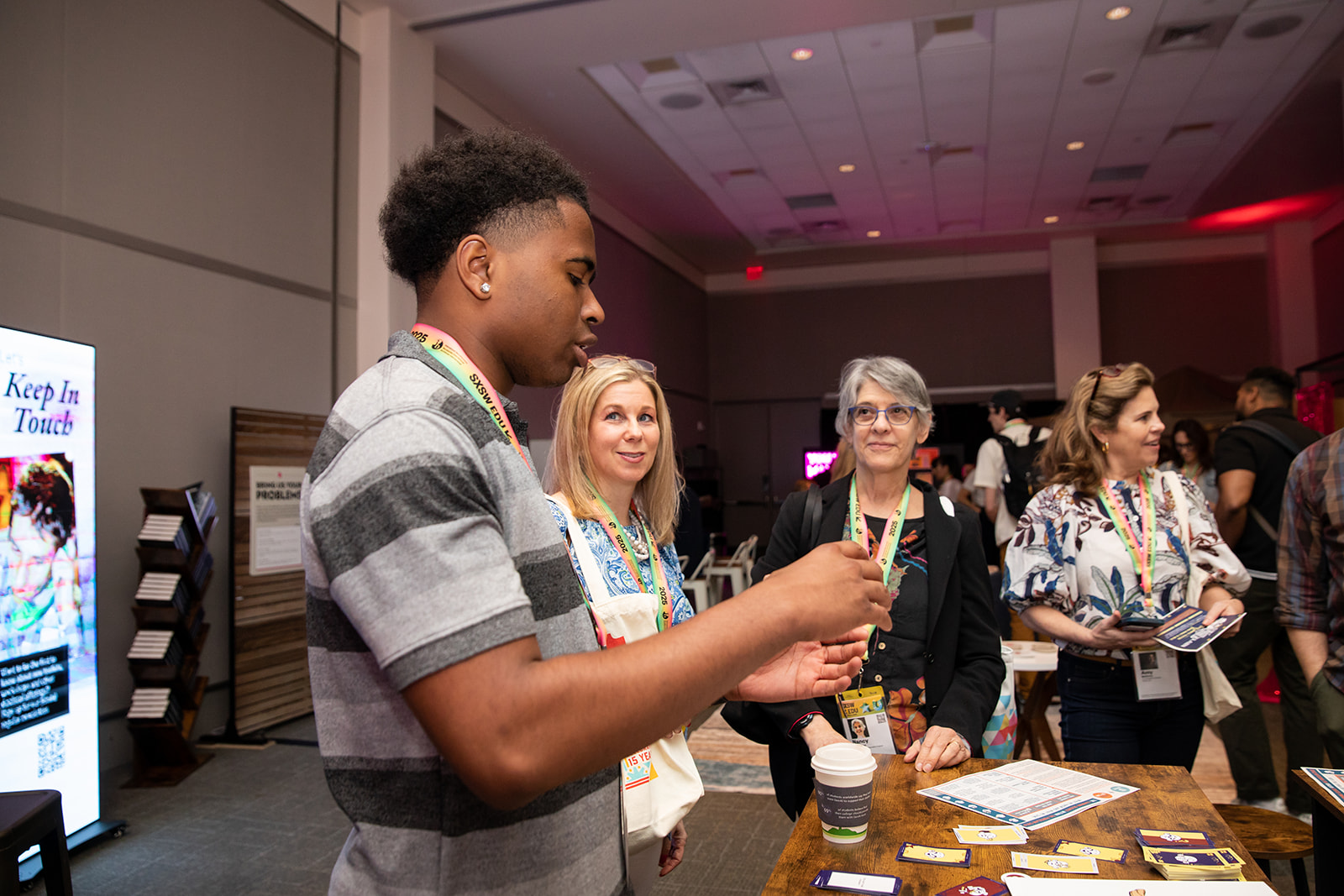
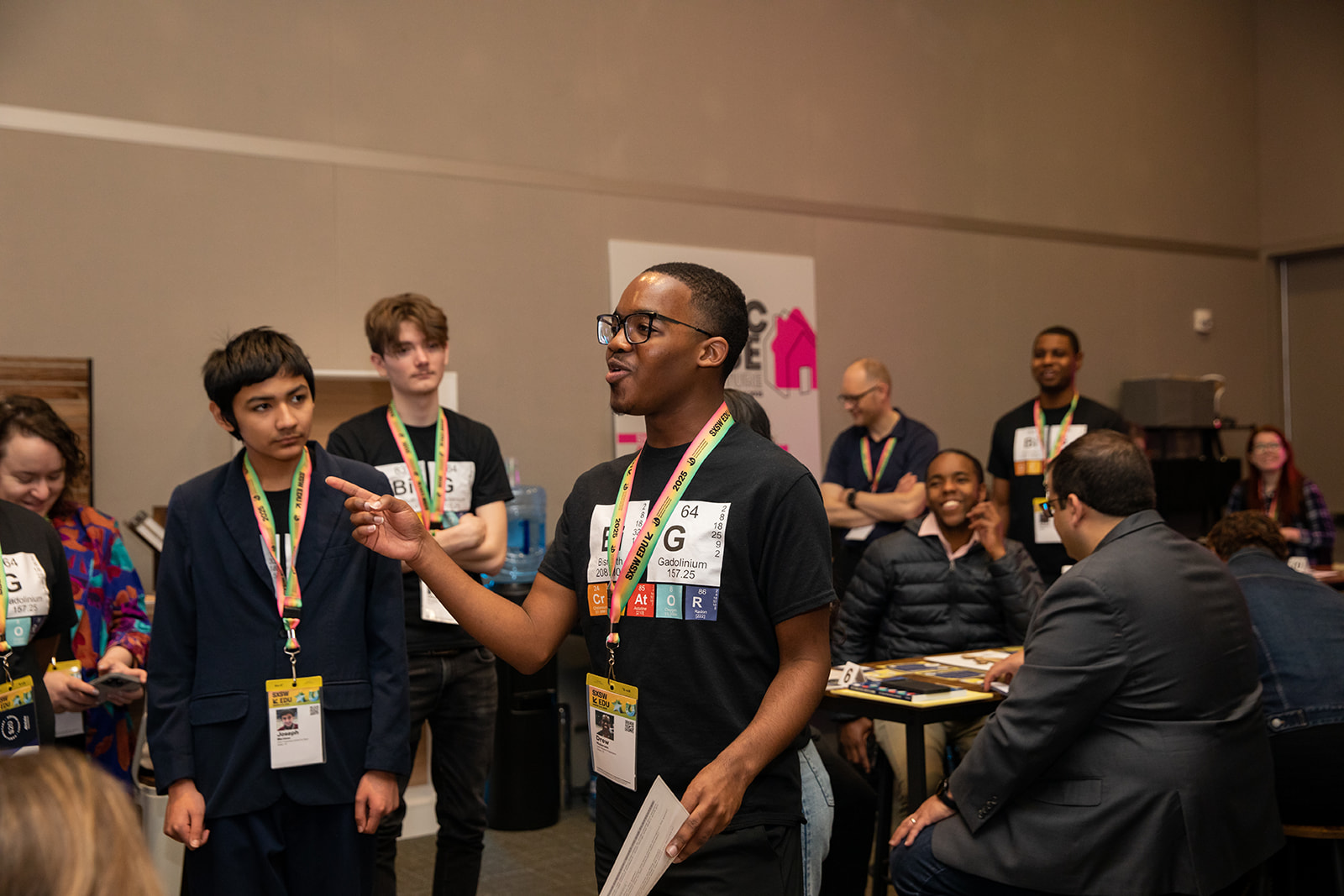
The teen design team behind The Porcelain Child was invited by the Siegel Family Endowment to present and playtest their game at the Stanford d.school lounge at SXSW EDU 2025 where adults engaged, reflected and offered feedback.
The Big Creators noticed the impact of their co-designed message, too. "Watching adults play the game, it gave me a different perspective," one said. "The parents who already had children were like, 'I could've done this differently.'"
Some youth took away an even more lasting message: "Being part of the art team gave me a great idea of what I'd be getting into if I was to do work like this professionally," shared one Big Creator.
Through co-design, they weren't just crafting gameplay—they were shaping a message. One that carried their truth, their experiences, and their hopes about disrupting adultism into places far beyond their original design table. In doing so, they discovered their strengths, clarified their values and realized their message—rooted in care, courage, and truth-could move people, shift conversation, and ripple far beyond the room.
COMMUNITY GROWN, RELATIONSHIP-DRIVEN
The Game Design Studio experience is designed to deepen relationships between teens and adults—showing what's possible when adults listen, support and step back to let teens lead. Nearly every Big Creator spoke to the impact of how adult facilitators show up during their co-design journey. "They gave us an open space," one teen shared. "They stepped back—but when we needed them, they stepped forward for us. So that really helped us grow."
That balance of support and respect was intentional. "When I say 'greatness,' we just want kids to get the best," shared Reggie Dupard, co-founder of Fit & Faithful Living. "We want our young people to know that if you need somebody in your life, we're here for you and we'll be that person that advocates for you."
Teen designers credited their team of adult collaborators-including our design team at iThrive Games/History Co:Lab, Big Thought's Armando Banchs, Evan Cleveland, Rachel Hull, and Denesha Ogunsegha; Art by Martell's Martell Holloway; and Fit & Faithful Living's LaChanda and Reggie Dupard, and the iThrive / History Co:Lab team—for creating space to explore, reflect and lead. The adults offered guidance when needed and consistently affirmed the genius and brilliance of the youth they worked alongside.
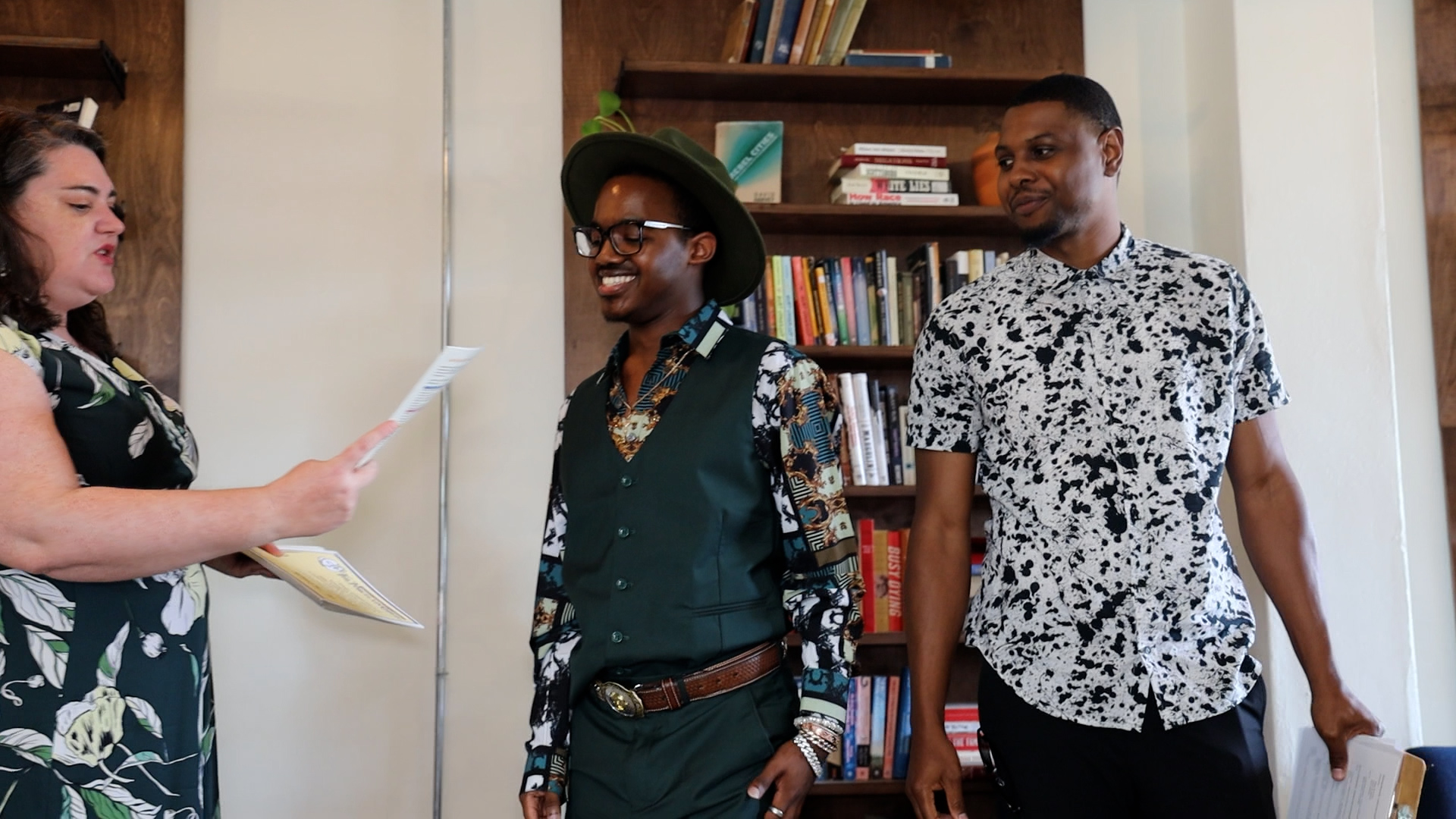
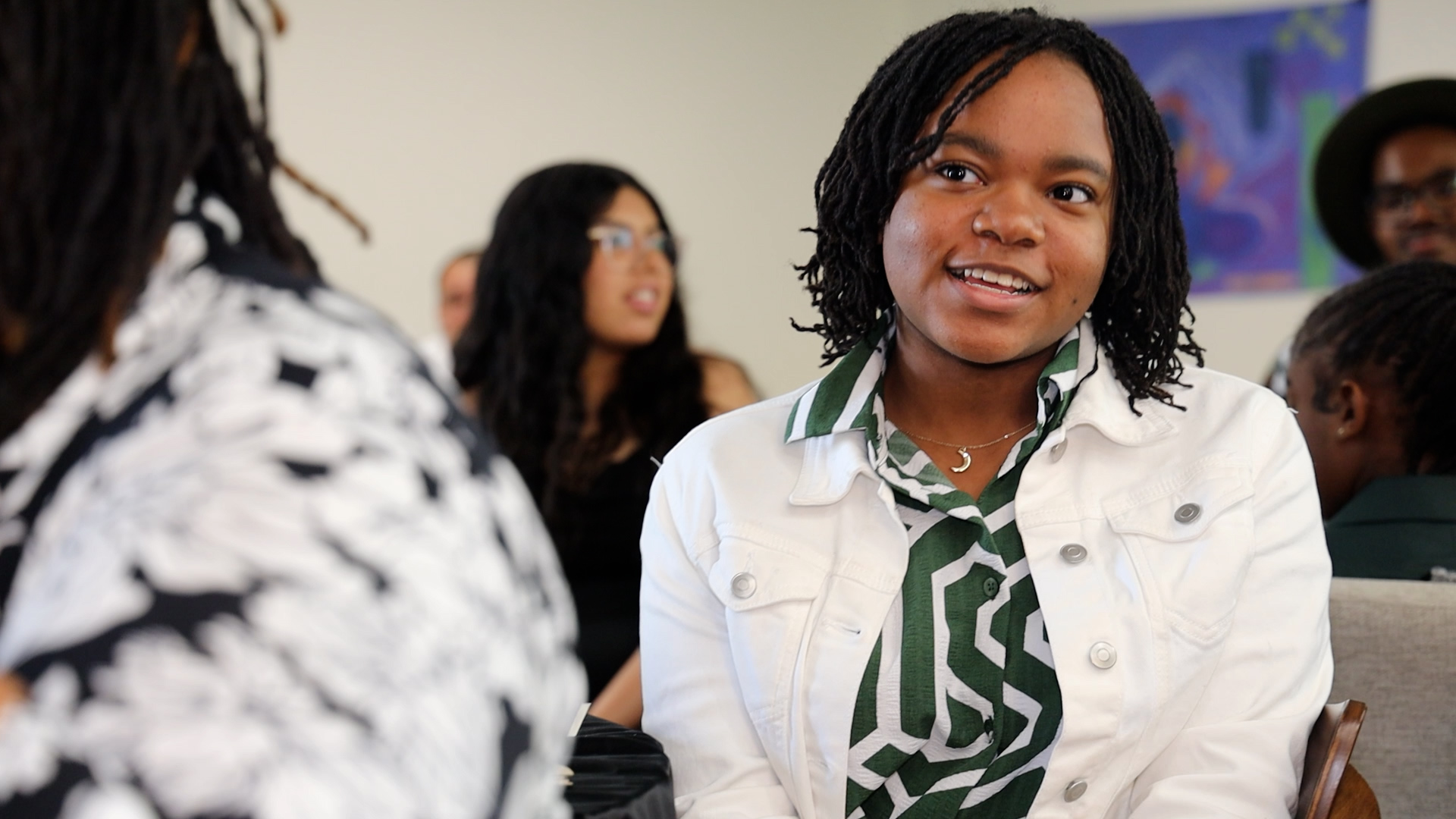
On Celebration Day, the teen designers behind The Porcelain Child celebrated their growth, reflected on their game and honored the intergenerational community that made it possible.
Big Thought's commitment to youth creativity through its Creator Archetype framework and direct-to-youth programming helped make this co-design experience possible. Their environment empowered teens to lead, explore, and shape meaningful artifacts of change. As Amarando Banchs, Sr. Manager, Creative Archetype, shared during the intergenerational team's Celebration Day, "These are the skills—grit, rigor, muddiness, storming and norming—that youth need to step into a world that's constantly shifting." He reminded the parents, guardians, friends of designers, and all listening that the most powerful artifact of this learning experience wasn't just the game—it was the teens themselves. "This work is about the heart. Look at the youth in the space that worked on this... because they're really the artifact."
On the culminating Celebration Day hosted at Big Thought's HQ, youth, families and collaborators gathered to honor what they built together. "This wasn't just a project," shared Fernande Raine, founder of and co-lead at History Co:Lab. "It was a coalition rooted in belief: belief in youth brilliance, and in the power of making meaning together."
MORE THAN A GAME
The Big Creators designed The Porcelain Child to do more than entertain—they designed it to invite adults into conversation, reflection, and change.
"This experience taught me how my voice can change situations I believe are unfair," shared one teen designer. "My hope is that adults reflect and realize how their actions impact a teen's mind," added another. "This game shows them," emphasized a third.
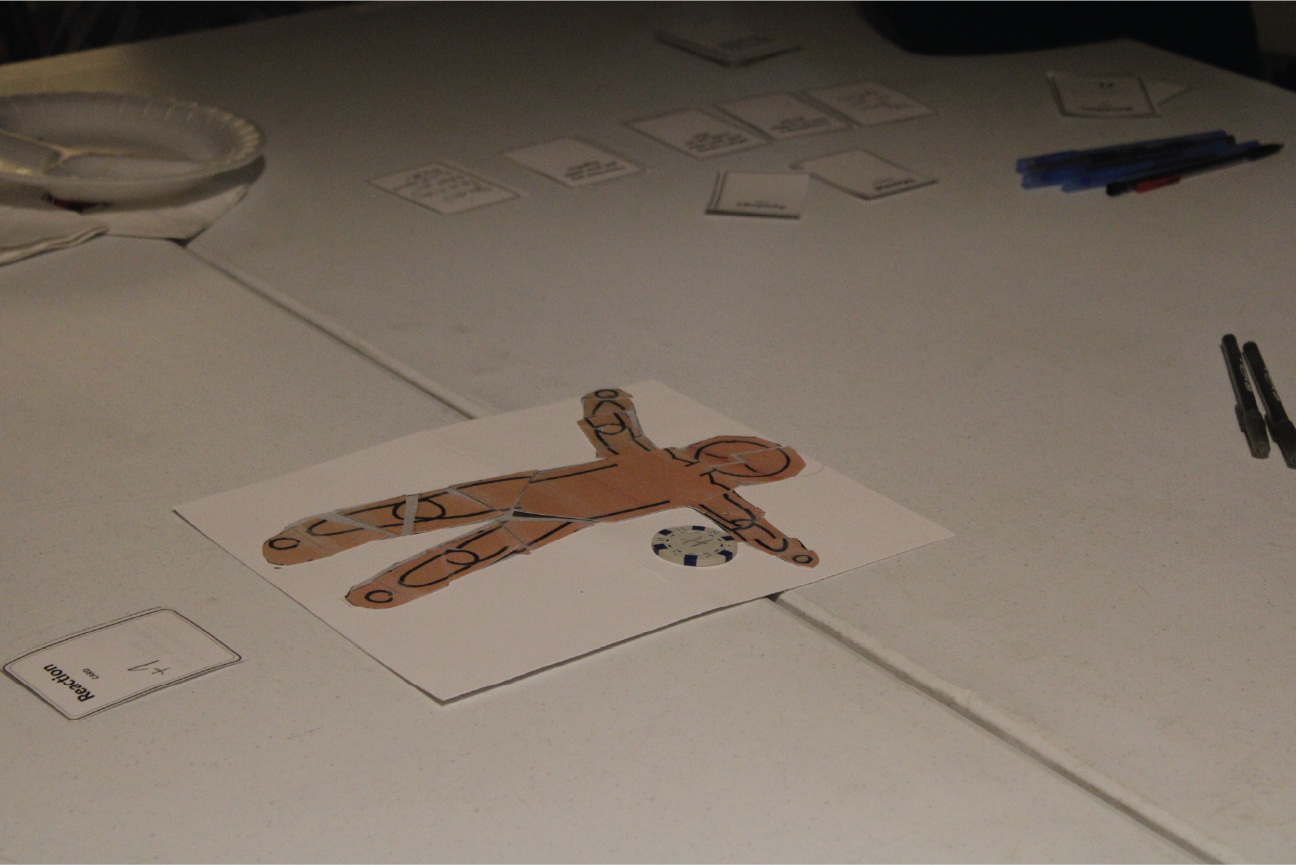
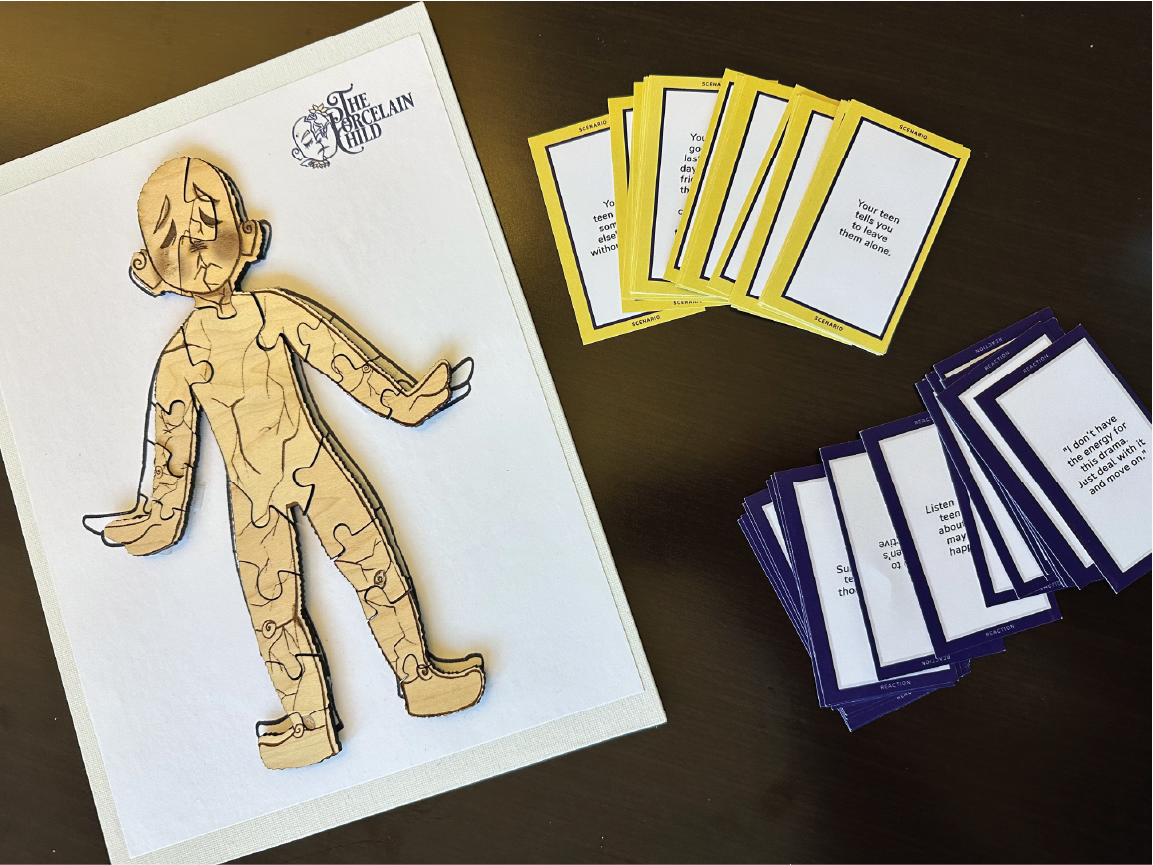
Early ideation vs. prototype phases of The Porcelain Child.
Through co-design, the youth behind the game transformed lived experiences into a critique of the systems that impact them. They deliberately designed mechanics, narratives, and choices to reveal how words and actions ripple through a young person's life. The result is an empathy-building, intergenerational dialogue tool that invites players to pause, reflect, and connect. As of May 2025, The Porcelain Child is being playtested across Dallas—on kitchen tables, in school gyms, and at community events—sparking conversations about listening, care, and the small moments that build or break trust between adults and youth. Each card played is a spark. Each round, a reflection. Each conversation, a step toward healing and change.
This game is just one example of what's possible through Game Design Studio—a model and toolkit used by educators and youth-serving institutions who believe in the power of young people to make meaningful change. Across schools, community programs, and even international settings, GDS invites teens to design tabletop games, digital stories, and immersive simulations that center their lived experiences and civic imagination.
Game Design Studio meets teens where they are—and offers them the tools to imagine, build, and lead us somewhere better.
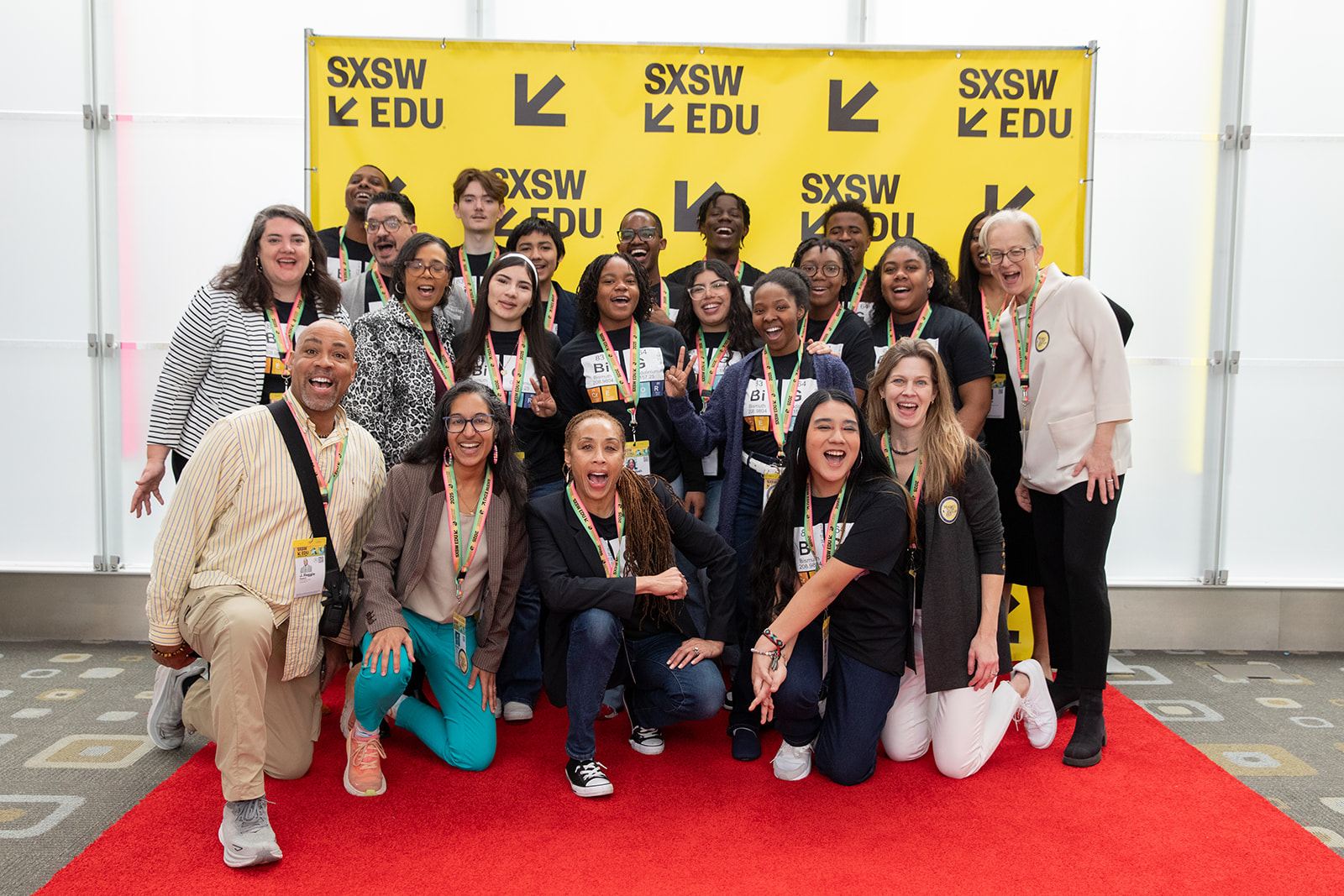
After leading their workshop at SXSW EDU 2025, the Big Creators stop for a candid, celebratory moment.
If you're a partner (i.e., educator, funder or youth-serving organization) ready to center teen voice in a transformational way—we invite you to connect.
Turning FEMA’s Lifeline Info Into an Immersive Game with iThrive Sim
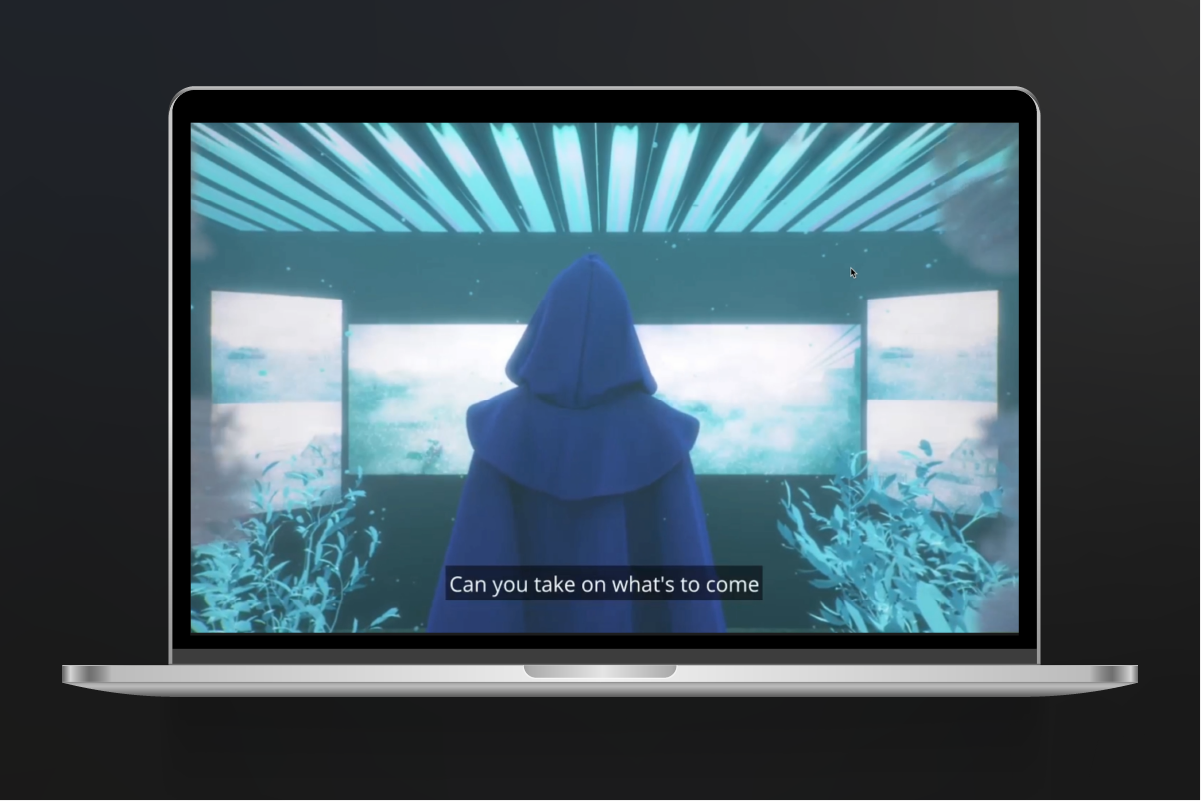
Young people feel the emotional weight of the world's challenges. They see the stories on their social media feeds and TV screens that bring forth questions, sometimes grief, and almost always hope for solutions that move us toward a world grounded in empathy, safety, and communal care.
Young people want to be a part of imagining and co-creating solutions that get us there, too, ones that bring forth better ways of being and doing that are supportive of their thriving and all our thriving. Teens and young adults already embrace and demand social action, according to the 2023 Deloitte Global Millennial and Gen Z Survey. Young and curious, they are instigators of change, with 83% saying they believe in their generation's power to inspire action in their local networks and impact societal problems, according to a 2020 CIRCLE Survey.
As agents of influence and drivers of transformation, young people wield within them a power to shape and steer both present and future. All in their learning ecosystem who believe in their genius and care about their thriving—from teachers to emergency management specialists—have a duty to nourish and honor that power.
For the Federal Emergency Management Agency (FEMA) Region 8 team, this duty led them to partner with the iThrive Games team to design and develop Disaster Mind, a disaster readiness and resilience-building game that meets young people where they are with play. Disaster Mind is a digital game designed to inspire social action toward community preparedness. Built and hosted on iThrive Sim, an award-winning game engine and development platform that creates and delivers role-playing simulations, Disaster Mind integrates live-saving information with interactive storytelling and an immersive play experience, actively connecting young people to knowledge that prepares them for disasters and activates them as movers and shakers capable of organizing their families, friends, and communities.
"We know that youth can be force multipliers in helping their families and households prepare for emergencies and disasters," shares Kirsten Maltese, the Youth and Adolescent Program Manager and a Community Preparedness Officer at FEMA Region 8. "[This] can spark a conversation with their friends and families but can also be a bridge between them and their local emergency management office. If we spark their curiosity and interest in preparedness at an early age, we can help them develop lifelong habits that will help them in their homes and communities."
A PLAN'S POWER: THE RESILIENCE PART OF DISASTER RECOVERY
Disaster preparedness is a silent sentinel that proves its power in times of chaos. It is core to disaster recovery. A proactive approach and an intentional mindset, reflected in historic taglines popularized by FEMA and on ready.gov like "Disasters don't plan ahead, you can" and "Prepare. Plan. Stay Informed," implore us to take action to reduce our vulnerability to disasters and increase resilience when they strike. "Disaster Mind gives potential survivors the opportunity to simulate real-life situations, " shares Daniel Nyquist, an Executive Officer at FEMA. "They make decisions that would lead to their eventual recovery." Here's how.
ITHRIVE SIM'S GAME-BASED LEARNING: A DIRECT-TO-YOUTH SOLUTION
Care in action means meeting young people where they are to support their thriving. In a world brimming with technology where over 600 million young people play video games, that includes leveraging play in spaces where they learn. Learning science shows that play has power; play supports engagement and can foster active learning through decision-making and problem-solving. In the months following the onset of the COVID-19 pandemic in 2020, as parents, guardians, and educators scoured for new virtual classroom and learning tools, many turned to play as a tool for connection and fun.
iThrive Sim launched in that same year as an accessible web-based and device-agnostic digital game engine capable of engaging young people in any educational setting or home with WiFi and a 1:1 device. The game engine delivers role-playing simulation games with integrated social and emotional skill-building. Players encounter unique stressors as they navigate challenges. They make real-time decisions that impact the unfolding narrative. With iThrive Sim, awarded for its learning engineering and design, we worked with the FEMA Region 8 team to build Disaster Mind, a single-player simulation game where players must navigate severe weather events, stay informed, and make decisions that impact how the story unfolds. The young people who play expand their understanding of disaster preparedness as they contend with unexpected weather events, manage its accompanying stress, and attempt to make the best decisions for the safety of themselves and their communities.
Disaster Mind has been both thought- and action-provoking for young people since its official launch on www.ready.gov this year. After playing, players express their motivation to get prepared, saying, "I should go home and make sure my family is prepared just in case something happens." Others shared in post-game focus groups that the simulation game expanded their sense of responsibility, opening them up to consider what it would be like to navigate a disaster without being accompanied by family or a trusted adult. The game is designed to activate and support young people's planning, involvement, and leadership in their community's preparedness efforts, core goals of the National Discovery Recovery Framework. "As young people navigate from support structures like their families and schools, we intend to help them prepare for their next phase in life," shares Maltese. "This type of engagement ahead of a disaster is what helps build resilience in communities - and we believe youth can be the driver of that."
THE SOCIAL AND EMOTIONAL SKILL-BUILDING IN DISASTER MIND
Vital to disaster readiness is prepping for the social and emotional. iThrive Sim's dynamic features are optimized to deliver experiential learning in a unique and developmentally nourishing way to teens. Disaster Mind is designed to be a social and emotional skill-building play experience that helps teens shift from an automatic mindset of "This won't happen to me" and "Other people will handle it" to an intentional mindset of "I may face an emergency at some point" and "I will think for myself".
Rather than prescribing learning, iThrive Sim encourages teens to make meaning of the content they encounter, allowing them to learn by doing and develop understandings that go beyond the surface knowledge of facts and information. Through a careful combination of game features and mechanisms that purposefully ignite feelings, teens are prompted to draw on their own experiences and skills while they make decisions. The game gives them opportunities to practice critical thinking, acquire and interpret information, and make real-time decisions while navigating challenges.
This active learning is transformative social and emotional learning.
WHAT A GAME LIKE DISASTER MIND CAN DO
The impact is in their testimonies.
Young people who've played the Disaster Mind simulation game walk away from it with a sense of ownership of the plan and investment in the outcomes, leading to greater participation and collaboration, too. "I've discussed with my family about disasters. We are making plans for them and intend on making them as clear and as direct as possible for everyone to stay safe during disasters," shared one of the first teens who tested Disaster Mind.
The scaffolded challenges, personalized feedback loops, and real-world applicable social and emotional skill-building that young people who play Disaster Mind experience makes them more familiar with the work of preparedness and the network- and community-wide planning and capacity-building efforts it entails.
"We often hear phrases like "if I only knew I would need..." or "I wish I had known that.." in the aftermath of disasters," says Nyquist. "Disaster Mind enables players to understand those needs in a safe and engaging setting before a disaster happens. This results in players being better prepared and equipped with information and strategies they need to maximize recovery resources and be resilient in their own recovery."
We knew that the effectiveness of Disaster Mind depended on young people wanting to play it. To ensure it would be engaging, relevant, and motivating for young people, we brought them into the design process using iThrive's as the participatory youth co-design approach. Their input shaped the story, the look and feel of the game, and the game mechanics. The impact and influence of Disaster Mind reflect the power of both co-design and game-based learning to engage young people in the work of inquiry, discovery, and reflection. Designed with collaboration and care and learning science, Disaster Mind animates and introduces life-saving strategies to agents of change and shapers for safe and resilient tomorrows: young people.
| |
PLAY THE DISASTER MIND SIMULATION GAME ON ITHRIVE SIM! 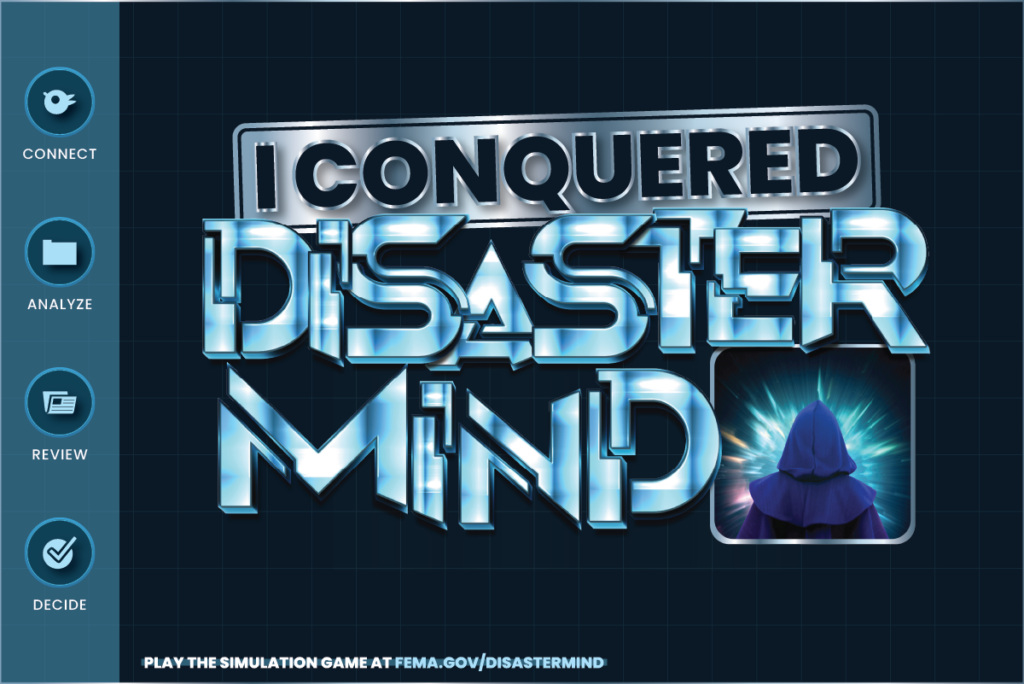 |
What is Power, and How Do We Get to Peace? Global Youth Have Answers.
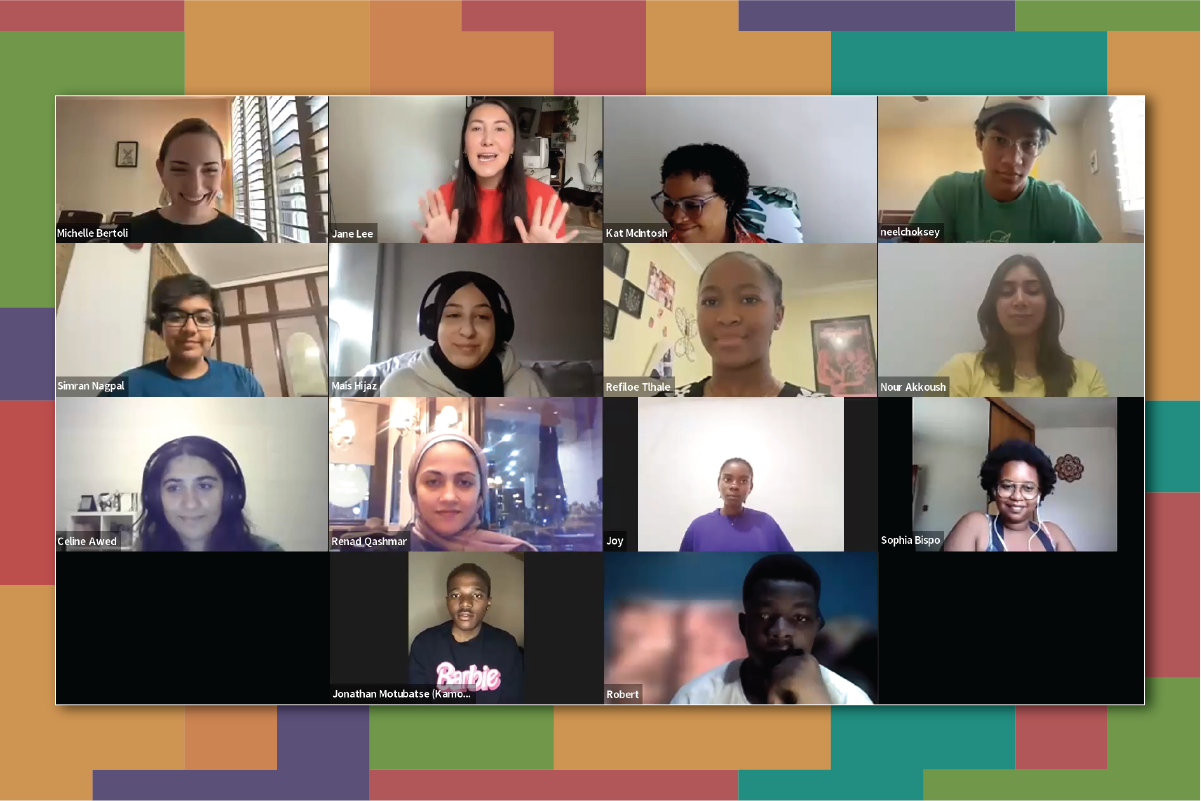
October 27, 1962, was a day that could have changed the course of world history.
That Saturday, the U.S.S. Beale dropped a series of non-lethal depth charges onto the B-59, a Soviet Union-operated and nuclear-armed submarine found near the U.S. blockade line around Cuba. Used to deter underwater warfare and intended as a warning, the charges sought to force the B-59 to the water's surface.
The captain aboard the B-59 had no way of knowing these were intended as warning shots. He had no contact from Moscow for several days, meaning no instruction, and after plummeting deeper into the waters to shield from the U.S. Navy's pursuers, his sub could not pick up or monitor radio traffic. Mistaking these warning shots as live explosives, the captain angrily convinced his men to arm the sub's nuclear-tipped torpedo and prepare for an attack under the belief that he was witnessing the start of World War III. If it had not been for the protocol that required all three of the B-59's senior officers to agree before initiating a nuclear launch, it could have been.
Though the captain was in favor, the sub's second in command refused to give consent. Instead, he calmed the captain down and coolly convinced his fellow officers to wait for Moscow's orders. His deliberate, careful action in a moment colored by fear and threat, real and perceived, eventually brought the B-59 back to Russia without incident. Most people did not know of his impactful decision until over 40 years later.
Like many events during the four decades of global political tension known as the Cold War, this close call signified the world's fragility at the time. The decision-making on the B-59 also mirrors how crucial the social and emotional were, as it motivated and underpinned every geopolitical move that could, if not made carefully, segue and cement doomsday.
Over the last year and with funding by the XQ Institute, the iThrive Games team has been co-designing Diplomacy in Action, a innovative learning experience (LX) that invites high school students in U.S. history classrooms to explore how the social and emotional show up in the intricacies of Cold War geopolitics. The co-design team includes The History Co: Lab's Fernande Raine, Ludic Learning's Paul Darvasi, Professor Jeremi Suri, the Mack Brown Distinguished Chair for Leadership in Global Affairs at The University of Texas at Austin, XQ's Matt Owens, and over 60 young people. Over the LX's six weeks, students are immersed in the Cold War. Through constructive and collaborative play and inquiry- and project-based learning, students assemble their historical insights and social and emotional skills into what becomes a Peacekeeper's Toolkit. As they step into their roles as U.S. diplomats to foreign countries in the LX's concluding iThrive Sim multiplayer simulation game experience, the Toolkit is their practical guide, helping them manage conflict alongside their peers. By the end of the game-based learning experience, students walk away with a deeper understanding of how fear and threat states impact decisions, of how power steers and shows up in global and domestic conflict, and real-time practice of critical thinking, responsible decision-making, and negotiation in tense times—social and emotional skills transferable to their real lives.
A CO-DESIGNED LX: BRIDGING INTENT WITH APPROACH
At iThrive Games, we firmly believe that empathy narrows the gap between intent and impact.
In the early envisioning of the Diplomacy in Action LX, our collaborative team of subject matter experts with backgrounds in history, adolescent development, social and emotional learning, serious game design, and game-based learning shared hopes of this LX being a memorable one for teens, intended to be interactive and deeply engaging for them. To ensure this, iThrive employed its strengths-based, co-design approach with teens and young adults, engaging them as thought and design partners throughout the LX's development.
Learn more about iThrive's co-design approach here.
Knowing we further our empathy through community and co-design, we made it a priority to create co-design contexts supportive of discovery for young people, ones that supported their emotional safety, challenged them cognitively, and helped them surface and express their ideas. By enlisting their expertise, genius, lenses, and experiences through co-design, the youth co-designers who've worked alongside us have been vital to helping make the LX all the more relevant to the teens it will reach.
WHAT GLOBAL YOUTH CO-DESIGNERS SAY
Co-designing with young people is always a joy, and last November, when the iThrive team gathered virtually with 16 teens and young adults living in more than a dozen countries, was no different. Through the Global Nomads Group, a nonprofit that connects youth across difference and distance, our design team met with interns from their Content Creation Lab across two sessions where they helped us co-design surrounding elements of the LX and playtest a prototype of its simulation game component.
Aligned with our intent to make this learning experience one that effectively considered power in multiple expressions and culturally responsive definitions of what power is, it was truly an honor to welcome a global lens in the creation of it. By interweaving it with the views and perspectives of young people from across the globe, the LX becomes even more resonant for the learners it reaches, reflecting both the diversity in today's world and the inclusion that will be central to it.
Here are a few of the takeaways from our last co-design session with the Global Nomads Group, marking some of our most memorable moments of knowledge-building and knowledge-sharing:
'US VS. THEM': UNPACKING POLARIZATION
Our design team, seeking to make the Diplomacy in Action LX applicable to the real world, invited young people to share their views on division and unity in today's world.

Their perspectives and thoughts helped our team think even more creatively about how to meet young people where they are in how they view polarization—a phenomenon that, throughout the Cold War and history, concentrated power in echo chambers and reinforced and exacerbated conflict.
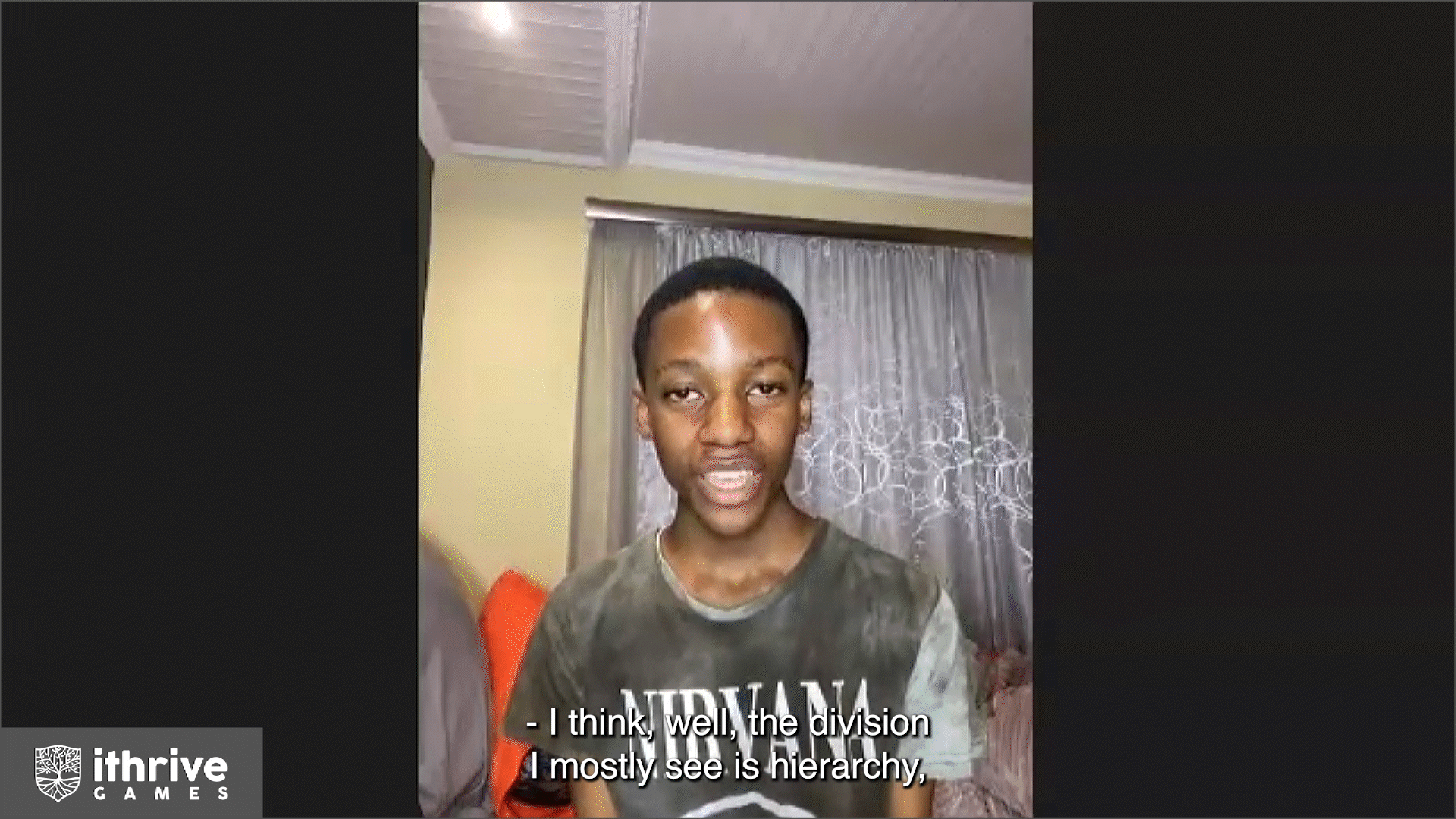
With their thoughts, our team expanded its operating understanding of powers' multiple expressions.
ASSESSING POWER OVER, POWER WITH, AND POWER TO
The 'Power Y' infographic appears frequently throughout the Cold War-inspired Diplomacy in Action LX and is a visual representation of three expressions of power—power over (meaning control), power to (meaning capability to do something), and power with (meaning shared power grown through partnership and collaboration).
To support the instructional design of a lesson plan for the LX that encouraged students to explore these expressions of power, our design team invited Global Nomads Group's youth interns to map and share how power manifests in their lives, communities, and screens.
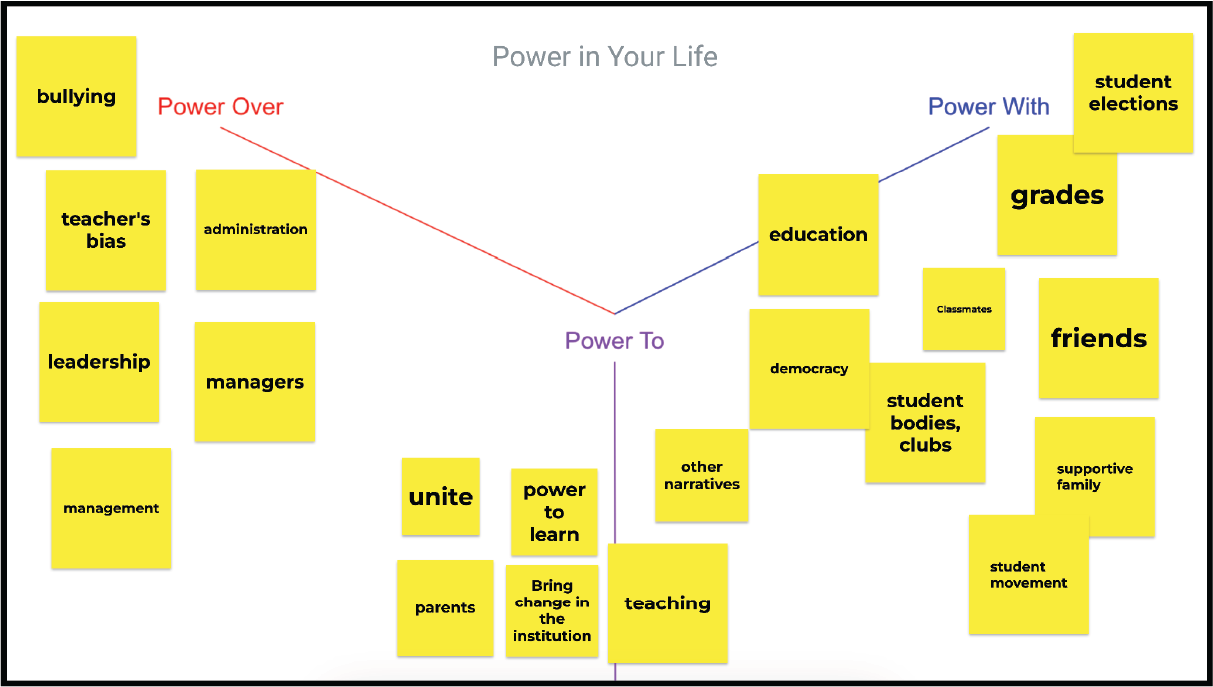

Their insights influenced how the LX prompts learners to plot power plays and chart diplomacy, using real-life examples to help them understand how power was expressed throughout the Cold War.
THE MAKINGS OF AND PATHWAYS TO PEACE
One of our favorite questions presented to youth co-designers throughout this LX's development prompts them to dive into the makings of peace. Our design team asked the group about the tools needed to combat division, manage conflict in today's world, and unite people across differences, much like Global Nomads Group's mission.
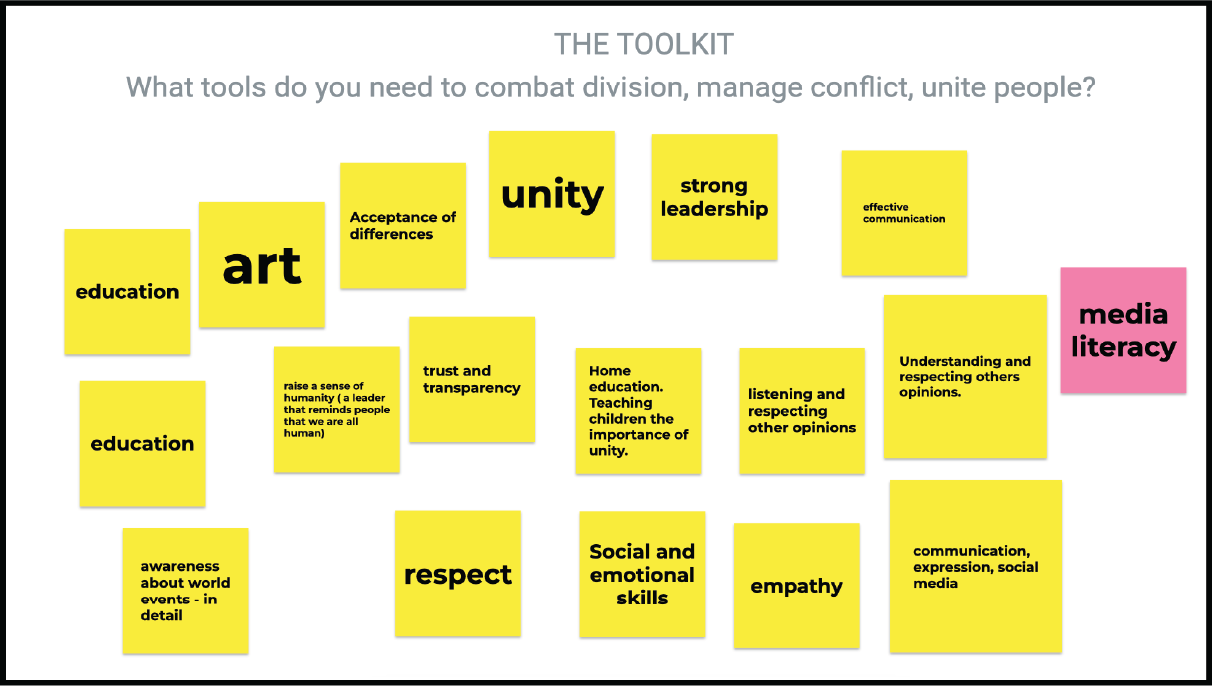
We asked the co-designers to convey what's needed at a micro and individual level and the tools leaders today need to make peace real. Many of their responses captured an array of skills, practices, and initiatives they viewed as necessary to achieve that goal.

From their thought partnership came directive and discernment on which surrounding elements were ultimately weaved into Diplomacy in Action's six-week LX of the many aspects of the Cold War that could've been included and explored. Their thoughts on what would be in a toolkit meant to support peace helped us shape the inquiry-based learning tracks throughout the LX, ensuring they align with what they view as vital to diplomacy today.
A special thank you to the young people at the Global Nomads Group, their facilitators, and all who joined us to help co-design Diplomacy in Action and co-create an offering reflective of ideas beyond our borders. Below, check out a highlight reel of the full co-design session, and sign up for iThrive's mailing list to be notified when the LX is available for piloting!
Our Year of Knowledge-Building, Knowledge-Sharing & Play
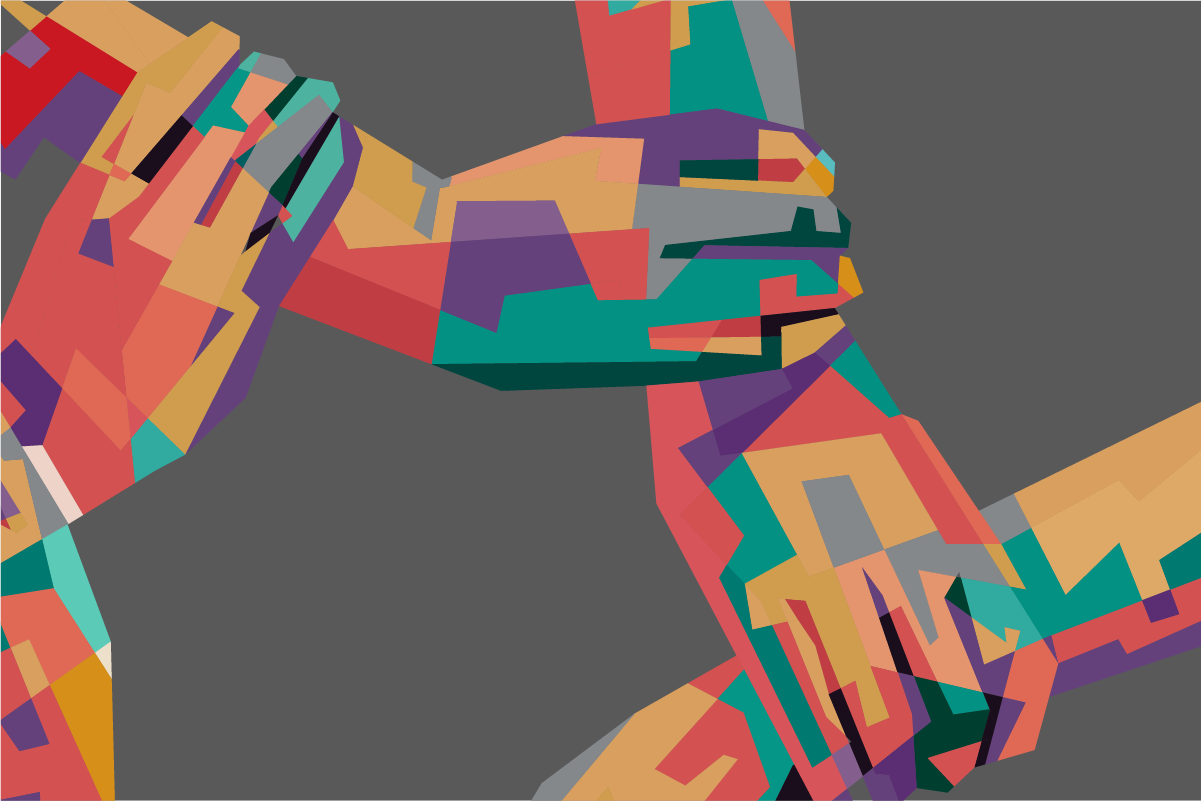
Joy enriches. As a connector, joy helps realize the 'we' and nourishes the 'us' that directs how we gather, steers how we imagine, and inspires what we create.
This year, joy guided our work alongside young people, nonprofits, government agencies, school communities, research institutions, game developers, subject matter experts, and learning experience designers. With teens and our partners, we built knowledge, shared knowledge, and co-designed transformative experiences for teens supportive of their learning, mental health, and thriving.
Throughout 2023, partnership propelled impact and possibility, helping us and those we collaborated with expand it in places where teens learn and play. Collaboration and community-building were consistently parts of all we did this year— from our co-design sessions that led to co-created games and learning experiences to the conferences and panels we were part of. In togetherness, we pooled strengths with teens and others. We leveraged the diversity of our experience and expertise and those we merged genius with to accelerate progress toward the world we each yearn—one where young people have the tools to live full, safe, healthy, and purposeful lives. It was amazing.
In celebration of what the year has been and all that is to come, here is a look back on eight joy-filled memories in no particular order, as well as our favorite collaborative moments, and unforgettable highlights from 2023:
#8. PLAYTESTING CADENCE FORD AT PLAY NYC
At Playcrafting's Play NYC this year, an event that magnified the power of play and brought hundreds of game industry professionals, indie game developers, and game designers together to exhibit their games to players and peers, we shared an iteration of Cadence Ford, the single-player, text-based strategy game we created with the One Love Foundation and Playmatics, LLC.
 |
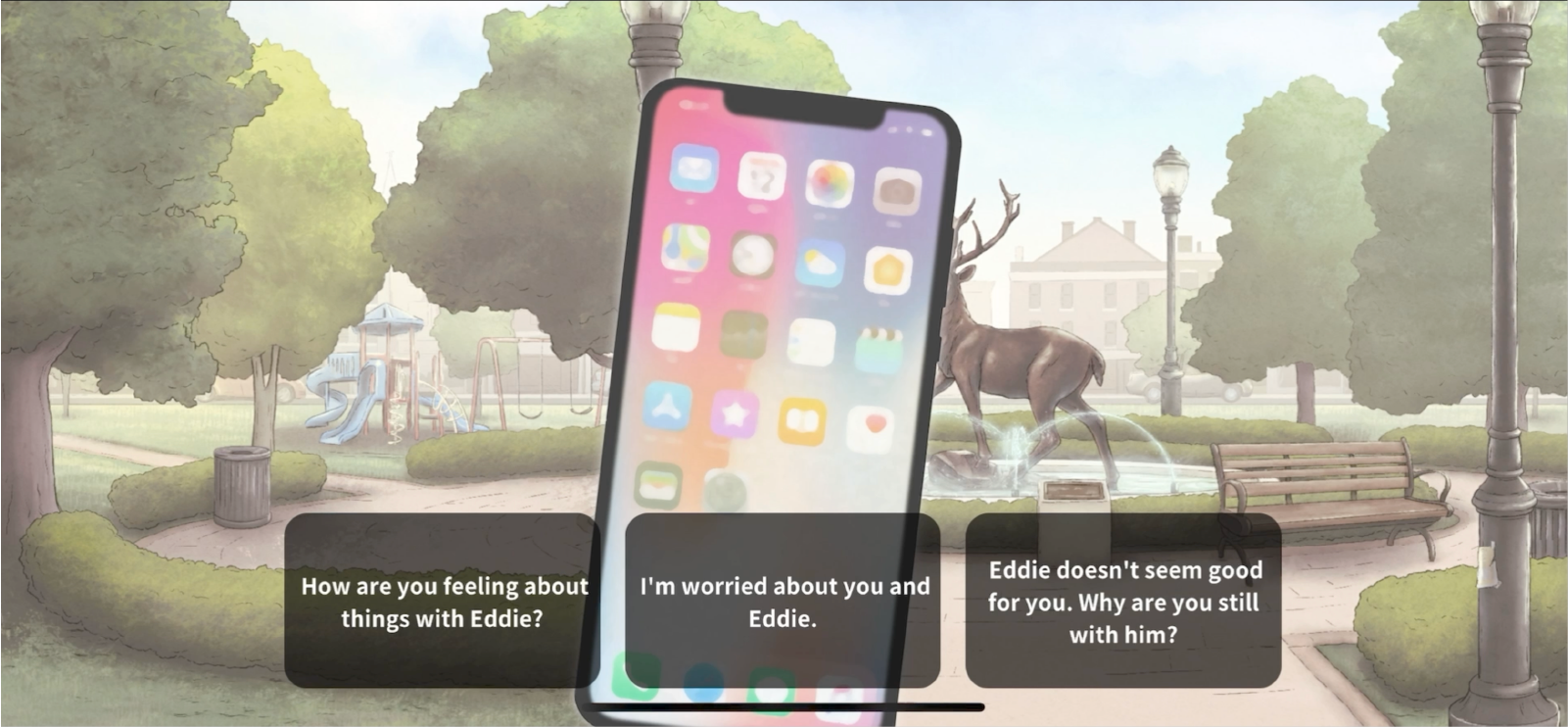 |
Building on One Love's mission to empower young people with the life-saving prevention education, tools, and resources they need to see the signs of healthy and unhealthy relationships, Cadence Ford supports young people in learning to love better, in being with partners who practice healthy Love and communicating with loved ones who are in unhealthy relationships. While New Yorkers of all ages played the game demo and shared feedback, teens, many of whom went on to become members of our Teen Hub, were particularly moved by the game's storyline, mechanics, and captivating 2D art. Read about Cadence Ford's co-design process and the forum for listening to and learning from young people we created at Play NYC.
#7. OUR CO-DESIGN WITH TEENS AT THE NEW YORK HISTORICAL SOCIETY
For the students from Thomas A. Edison High School who gathered at the New York Historical Society with us, History Co: Lab, a graphic notetaker, and others in Educating for American Democracy (EAD)'s network in November 2023, the co-design workshop presented an opportunity rare in their worlds—a chance to share how they envision democracy and impact civic learning that supports the future of it.
Our Game Design Studio model at the center of the co-design experience engaged them not just as students at the end of learning experiences but also as thought partners in co-designing them, setting the stage for meaningful co-creation. The teens, who ended up devising and developing a prototype for a new interactive EAD-inspired card game created to inspire high-quality civic learning experiences by the end of the workshop, called it "promising," "progressive," "unique," "revitalizing," and "relief." Read how the model brought many across the civic education ecosystem together and what came of the teens' collaborative experience.
#6. THE LAUNCH OF OUR DESIGNING FOR TEEN THRIVING MAILING LIST
Impact-driven nonprofits, youth-serving programs, and government agencies trust us to preserve their commitment to teen wellness and thriving.
This year, we launched Designing for Teen Thriving, a mailing list that gives people like them access to the resources and insight of iThrive's game designers, learning experience designers, and teen social and emotional development experts. Subscribing to the list helps individuals looking to create developmentally nourishing experiences and wellness-supporting games for teens (with us or on their own) ensure what they create meets young people where they are and supports their thriving.
Join the Designing for Teen Thriving mailing list today!
#5. THE SOFT LAUNCH OF DISASTER MIND, AN ITHRIVE SIM GAME MADE WITH FEMA
The work of disaster preparedness, response, and recovery is as emotional as it is manual. Disaster Mind, the single-player simulation game built on the iThrive Sim platform with Federal Emergency Management Agency (FEMA) Region 8, supports young people's understanding of it.
This year, the FEMA Region 8 team soft-launched the game after one and a half years of development.
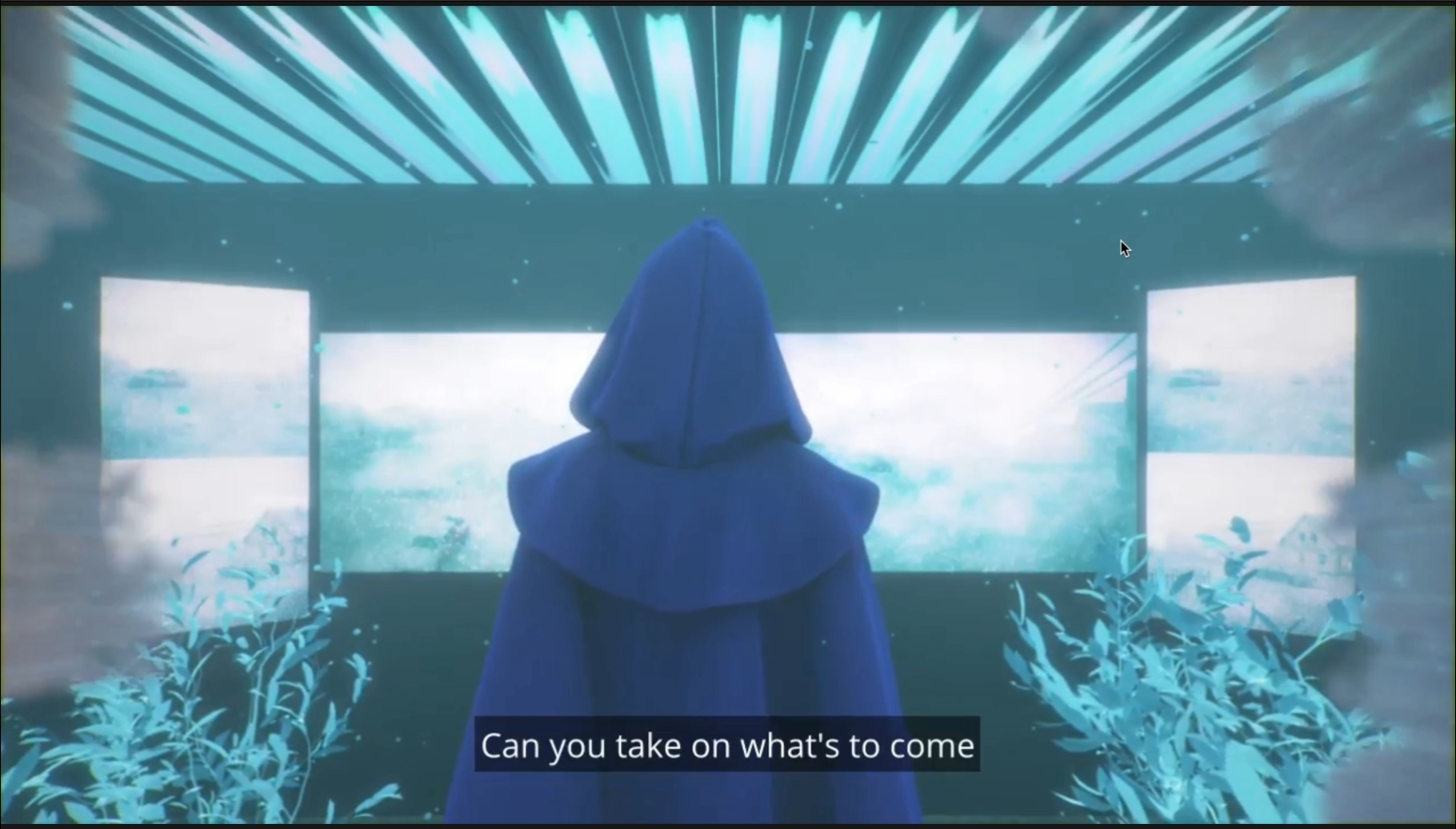 |
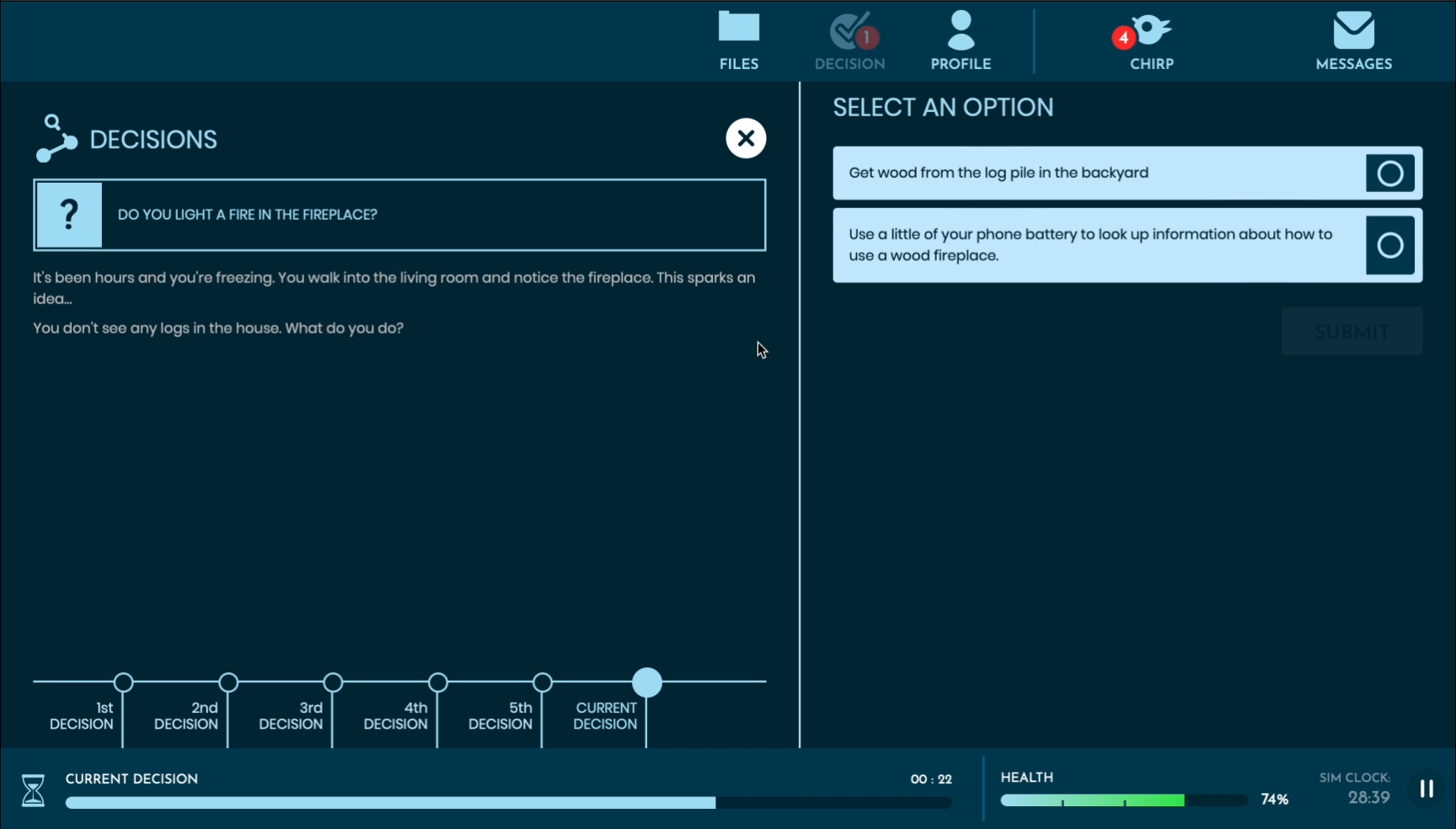 |
Young people who've playtested the game have reported feeling more confident in preparing for an emergency, managing the associated stress, and understanding the intentional mindset that underpins disaster preparedness. Many also have relayed plans to turn their awareness into action, mentioning specific disasters and sharing plans to talk to their families about exit plans, emergency kits, and meeting locations. Dive into the Disaster Mind's co-design process and explore what teens had to say about its readiness and resilience-building play experience.
#4. OUR CO-DESIGN WITH H.S. STUDENTS FROM THE GLOBAL NOMADS GROUP
Also this year, as part of an exciting learning experience design project currently underway with History Co: Lab and the XQ Institute, members of the iThrive Games team had the opportunity to gather virtually with high school students from the Global Nomads Group across two co-design sessions.
True to our norm of iterating for impact, the young people, hailing from several countries across the world, met with us to go over parts of the game-based, social and emotional skill-building experience we're creating, lending their ideas, feedback, and expertise to make it as engaging, accessible, inclusive, and resonant as possible. The play-filled meetings featured icebreakers, stretches, constructive questions, and Jamboards. It was an honor to learn from them while supporting their design thinking in the connective experience.
#3. ITHRIVE SIM NAMED A LEARNING ENGINEERING TOOLS COMPETITION WINNER
This year, the iThrive Games team was named one of the 32 winners of this year's Learning Engineering Tools Competition, selected from over 1,000 edtech innovation proposals submitted worldwide.
The win and accompanying $100,000 Growth Phase award in the Transforming Assessments track enables our team to expand iThrive Sim, our playful engine that hosts, powers, and evaluates immersive and interactive role-playing simulation games, with new ways to measure and assess the teen social and emotional learning fostered in them while developing alongside others in the growing learning engineering discipline. We are honored to share this win with our software development partners at Affordance Studio and EdTech Recharge's Kripa Sundar. Learn more about the Tools Competition and the expanded iThrive Sim to come.
#2. THE CONFERENCE CONNECTIONS
Attending game-filled, educational, and ed-tech conferences was an absolute favorite for us this year.
At Games for Change, we learned tons from designers, researchers, and changemakers, and at ED TECH WEEK NYC, we explore how tech innovation continues to support access, learning, and workforce development.
Members of our team also had the opportunity to showcase our co-designed games at ED Games Expo and PLAY NYC and lead discussions elsewhere too. In March, as part of MA Civic Learning Week, we shared on iThrive Sim's transformative civic learning games for high school classrooms. At ASU+GSV Summit in April, our Executive Director and Chief Scientist Susan Rivers talked about the necessity of social and emotional skills in today and tomorrow's careers on an American Student Assistance panel alongside others invested in the thriving of this generation's learners. At NSLA's Summer Learning Summit in October, she joined the Education Innovation Stage with other thoughtful experts to discuss learning and youth development that can inspire, challenge and deepen summer learning.
Each space we shared with others was carried by joy and animated by an eagerness to connect and collaborate with others eager to merge genius and create better systems of care and learning.
#1. OUR CREATIVE COMMONS-LICENSED, GAME-BASED LEARNING LIBRARY
Access enables impact. This year, we opened access to our game-based, social and emotional learning educational resources by licensing them under Creative Commons. Educators and teen-serving adults who care deeply about young people's thriving can merge it with their work and expertise.
Each iThrive Curriculum unit, iThrive Sim curricular surround, iThrive Game Design Kit, iThrive Game Guide, and iThrive-authored PDF resource can be remixed, redistributed, and built upon. Dive into them!
Whether you're a teen who co-designed or playtested with us, a partner or collaborator who co-created with us, an educator who brought our resources to your students, a game designer who used our game-making resources, or a supporter who read our blogs and cheered us on, we appreciate each of you for the many ways you engaged with us this year. A heartfelt thank you for sharing in our vision of teen learning and thriving, and happy new year to you and yours!
Making Civic Learning Meaningful With and For Young People

"Promising."
"Progressive."
"Unique."
"Revitalizing."
"Relief."
When Moiz, Tanisha, Ibad, Jaiden, and Samirah were asked to describe in one word the workshop they took part in with designers and museum educators from Educating for American Democracy's civic learning community earlier this month, the students from Thomas A. Edison CTE High School shared these, capturing how resonant and rewarding the co-design experience was for each of them.
Through iThrive's Game Design Studio, the playful, strength-based participatory design model that steered the afternoon workshop, the teens were engaged as equals and experts as they spent three-and-a-half hours vision-setting, imagining, and ideating alongside others in the civic education ecosystem. For the 17-year-olds, the collaborative space presented an opportunity rare in their worlds—a chance to share how they envision democracy and impact learning that supports the future of it. "[This] really gave me reassurance," shared Ibad. "There are people working to make our future better using our own opinions."
Brought together at the New York Historical Society by a project with Educating for American Democracy (EAD), an initiative working to reimagine history and civics education and make it a national priority, the students joined with iThrive Games, History Co:Lab, and Every Museum a Civic Museum, museum educators from Intrepid Museum, the New York Public Library, and the National Museum of American History, curriculum developers from Re-Imagining Migration, and graphic notetaker Aaron Mayper to create a versatile tool that supports the design and development of inquiry-based civic learning experiences.
Pairing the teens with learning-science-backed tools to help them mine their genius and craft playful solutions alongside peers and subject matter experts, iThrive's Game Design Studio model facilitated the day's knowledge-building and knowledge-sharing, setting the stage for meaningful co-creation. By the end of the workshop, we had a paper prototype of an interactive card game that animates and amplifies driving questions in EAD's Roadmap. With the session carried by teens' curiosity, creativity, and wisdom, the day was a testament to what teen-centered co-design can do and the impactful solutions it brings forth through radical collaboration.
CO-DESIGNING FOR MEANINGFUL CIVIC LEARNING
Civic learning supports both individual and collective thriving.
Studies conducted by the National Conference on Citizenship and researchers show that civic learning inspires socially responsible civic engagement, increasing a person's likelihood of voting. Beyond motivating the fulfillment of civic duties, when high-quality civic learning experiences prompt students to think critically about current socio-political events, students are more likely to engage in civil discourse with their peers. Despite this benefit, 92% of teachers are reported to shut down and stop conversations between students when argumentative or contentious.
There is a clear need for high-quality civic learning curricula that effectively supports inquiry and triggers curiosity in young people while accounting for what they and those who educate them experience. Only through radical collaboration and intentional partnership can we hit all the marks. The learning-science-backed Game Design Studio model brings both into shared spaces. Its use earlier this month at a synergetic workshop with HS students to create an interactive learning experience design tool reveals what the inventive and playful co-design method can do for civic education.
THE DESIGN CHALLENGE: BUILDING THE DECK
When teen and adult participants gathered at the New York Historical Society to co-create with each other, the goal of the session was clear—develop a resource that helps educators in all public spaces devise and design civic learning experiences that stimulate discussion, debate, reflection, and critical thought about American democracy. The resource needed to align with EAD's Framework and support the imaginations of educators and learning experience designers while being user-friendly and versatile enough for use across all grade levels.
Drawing inspiration from XQ Institute's competency cards, everyone in attendance knew early on that whatever we created together would, by design, support a rethinking of educational experiences. In this case, that meant enlivening civics and history in a communally defined and teen-centered way.
THE CO-DESIGN EXPERIENCE
The Game Design Studio (GDS) model was devised by social psychologists, accessibility experts, and learning scientists to create a supportive context for discovery where teens feel safe, seen, and heard, and where they connect about issues important and relevant to them (not just what adults think is important).
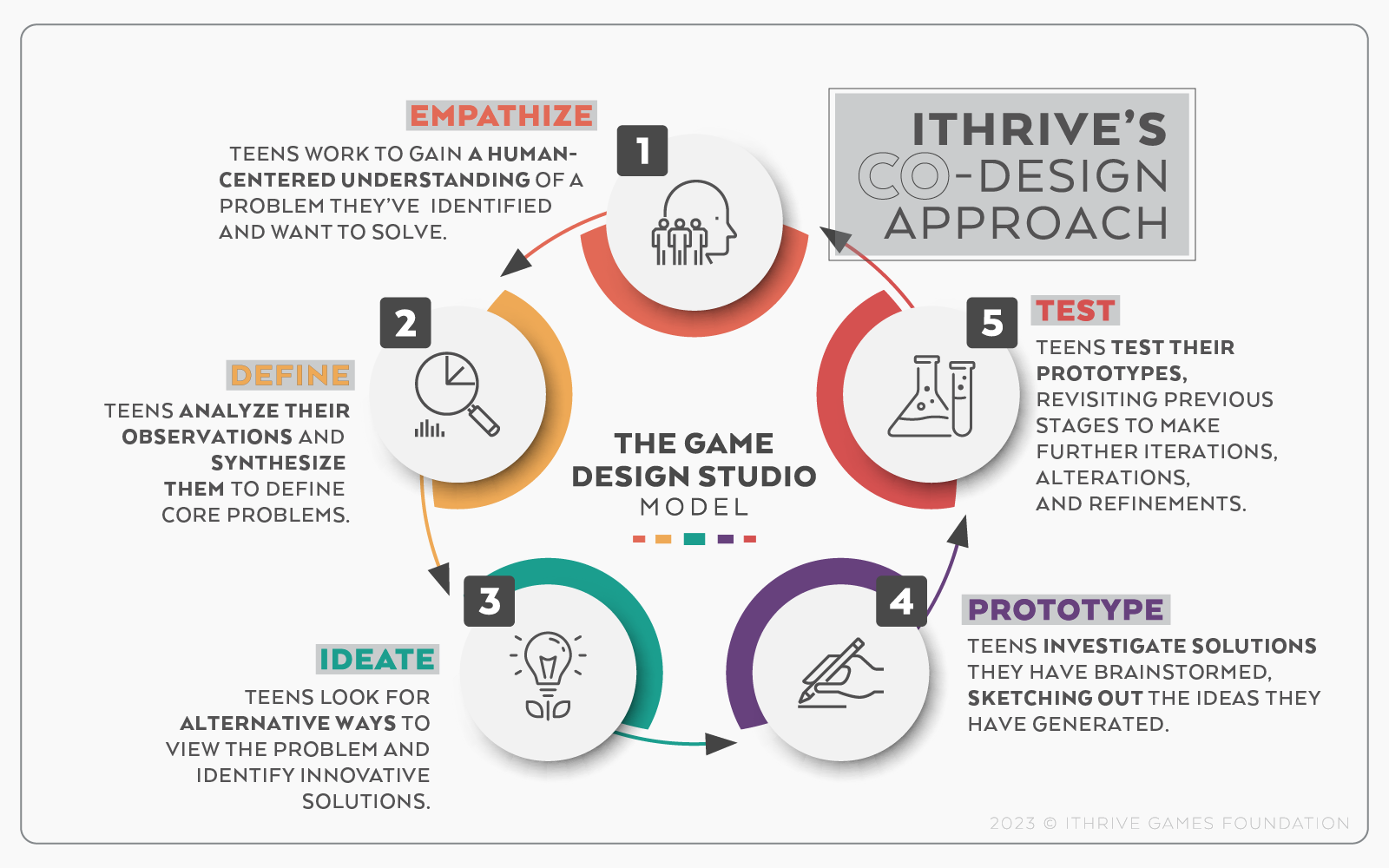
Explore the activities inspired by iThrive Games' Game Design Studio model in our Game Design Studio Toolkit.
True to the model, the session at the New York Historical Society started with the students learning more about the day's opportunity to influence civic learning for democracy. After they were given an overview of the goals and intended impact of the Educating for American Democracy's Roadmap, adult participants began to trickle in and when everyone was in attendance, the workshop kicked off with play. Educators, teachers, and designers played Our Threads, a connection-building question card game iThrive developed with Fugees Family, Inc., to warm up to each other and after playing a few rounds and reflecting on what a card game can do, joined forces to create a vision for the day. While naming these goals, the workshop's participants also talked through their definitions of a democracy that is inclusive of and healthy for everyone. These high dreams anchored us and our work together as the co-design session progressed.

Aaron Myper, a graphic notetaker, supported the co-design session with drawings and doodles that helped record the insights shared.
The icebreaker conversations and play were followed by empathy mapping exercises, where teens and educators reflected and shared their lived experiences as students and teachers. Deepening everyone's understanding of what the other feels, thinks, and does helped the group define success criteria together and clarify all that our learning experience design tool needed to address in order to be effective.
Then came the brainstorming.
Working collaboratively in small groups, students and educators began ideating ways to reflect the experiences and needs of students and teachers in an interactive card game that pulled from themes and design challenges in EAD's roadmap. Small groups shared their ideas with the larger group for feedback in support of fine-tuning.



Teens join with teachers, learning experience designers, and museum educators to co-design. As part of the collaborative experience, teens explore the XQ Institute's competency cards.
Ideas came to life when groups created prototypes that were tested and refined. Toward the end of the workshop, teens pitched to the larger group on the creative solutions they devised with others. An early prototype of the interactive card game to come, developed with the support of graphic notetaker Aaron Mayper, seeks to help educators create civic learning experiences for teens that prompt them to ask difficult questions and answer them through analysis and discussion.The first iteration of the game asks users to pick a card from a deck of 'big' questions from the EAD roadmap, like "What is power?" and "What is a social contract?" and pair it with contextual factors like year, racial identity, gender, and location from another deck that modify how the question is answered. Teen co-designers also suggested adding 'to me' wild cards to the game's deck to encourage learners to reflect deeply on their own identities and values.
The co-design experience was an impactful one that encouraged teens to define meaningful civic education and invited their influence over how its envisioned by educators. From their hands-on role comes a tool that inspires civic learning experiences in public spaces everywhere that are relevant to them, reflective of their hopes for democracy, and responsive to their educational needs.
THE POWER OF 'CO' GETS US TO IMPACT
"My voice as a student was heard," shared Moiz. "My opinion was valued."
"I realized that as a young person my voice does align with those older than me," echoed Tanisha.
"This workshop has changed the way I think about democracy. I have learned that my voice matters and makes a difference. Even if I cannot vote, I can still make an impact by sharing my perspective in this space."



Using the Game Design Studio model, teens are engaged as experts and thought partners throughout the co-design experience.
For the high school students who took part in this co-designing workshop, as well as the adult participants, the Game Design Studio (GDS) model that anchored the day helped create an all-embracing experience. By designing civic learning experiences in this collaborative way with teens, we integrate their vision for the world they will one day inherit in the planning of them with a method of cooperation that affirms and empowers them.
"Today's youth are tomorrow's future," shares iThrive's Executive Director, Susan E. Rivers. "When the Game Design Studio model is brought to the civic learning space to support the co-design of compelling learning experiences, it disrupts a limiting view of young people as just learners by engaging them from the start as thought partners too."
The co-creative space both teens and adults helped establish that Wednesday afternoon attests to how radical, intentional, and inclusive collaboration can inspire new ways of thinking, doing, and being.The output of the joint experience—an interactive card game and learning experience design tool—are the creative and impactful solutions that come from thoughtfully merging teen genius with subject matter experts. The teen co-designers' reflections show the GDS model's impact on the personal level and its unique ability to deeply engage teens in building better systems of learning.
"The only way to design a new system is not just to "involve" young people in the process: we have to engage in intergenerational co-creation," shares Fernande Raine, CEO and Founder of The History Co:Lab. "Many organizations create token roles for youth that are little more than fig leaves on blatantly adult-centric systems. We want to create spaces for the genius of the teen brain to help imagine and steer us towards the future that this world needs."
Our co-design model and approach honors the strengths of teens who are uniquely wired to learn by fully engaging them in their genius, and with it we are accelerating progress toward a world where young people are heard, healthy, and co-creators of systems supportive of their thriving.
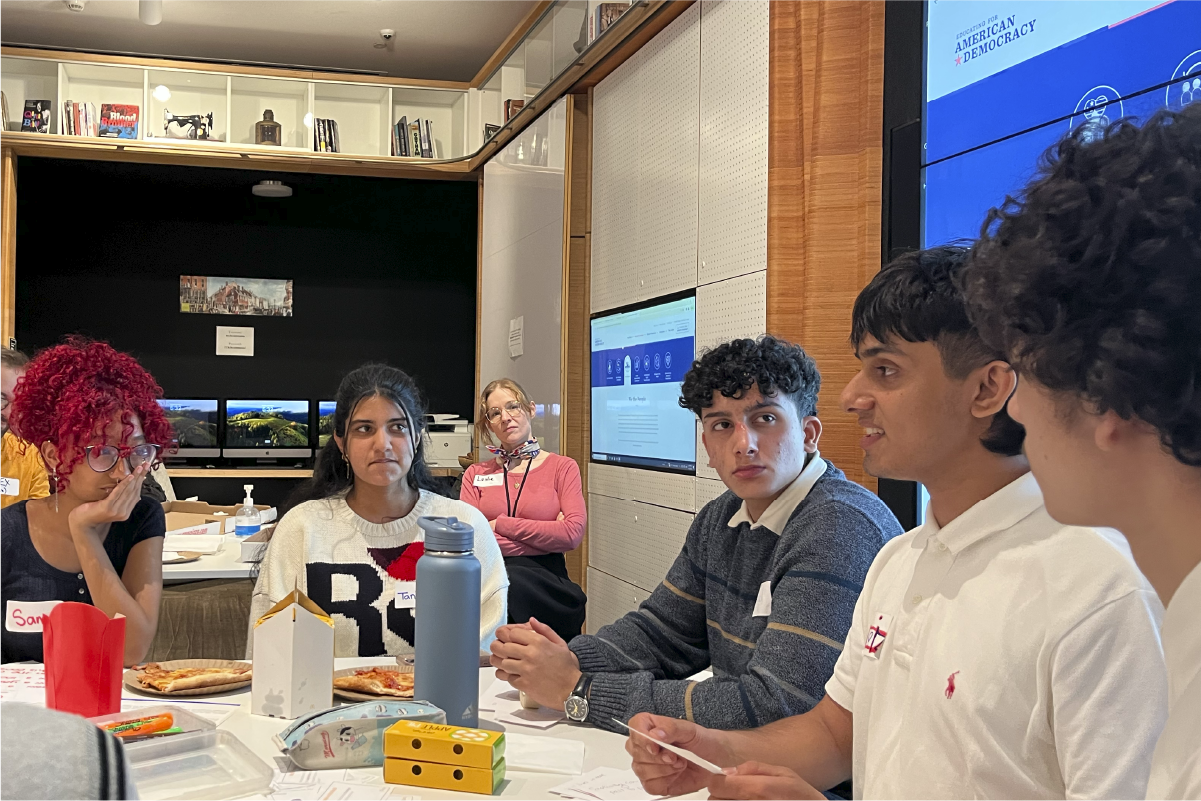
CONNECT WITH THE HISTORY CO:LAB AT THE 2023 NCSS ANNUAL CONFERENCE IN NASHVILLE, TN, TO PLAYTEST OUR PROTOTYPE OF THE INTERACTIVE CARD GAME!
FEMA’s New Game, Built on iThrive Sim, Preps Teens for Natural Disasters
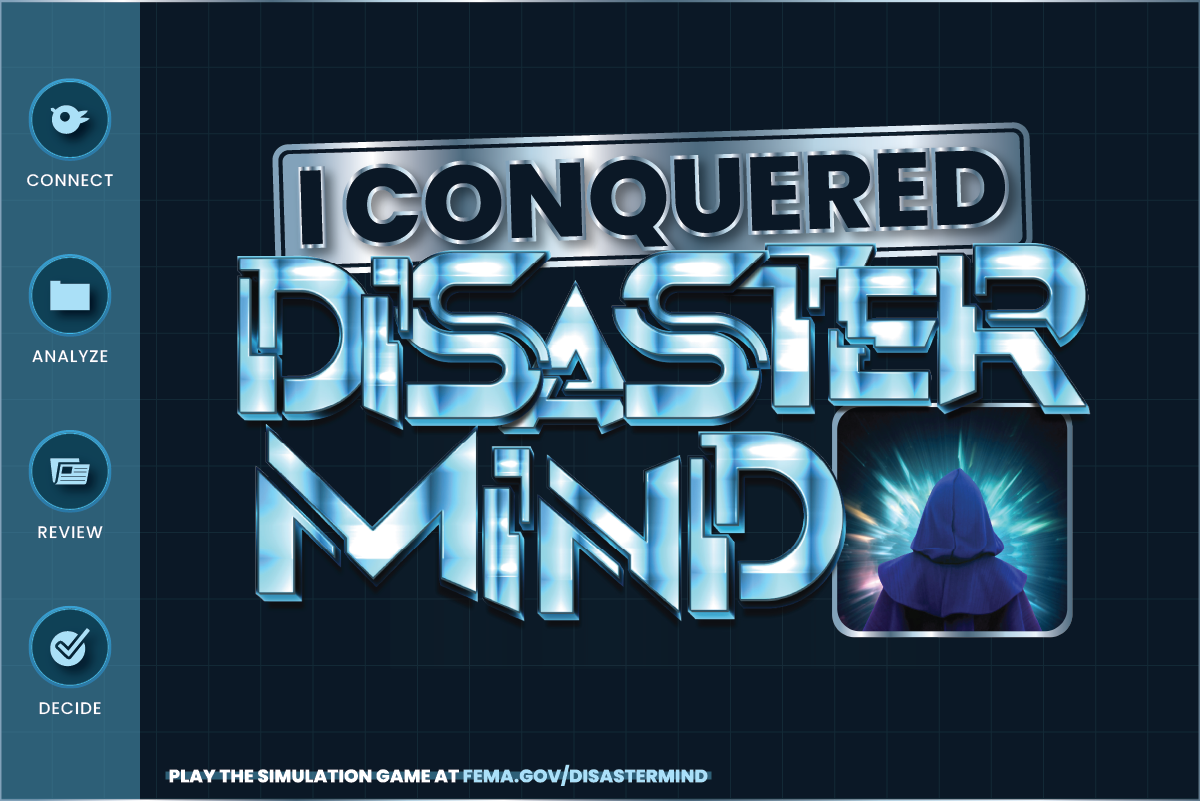
With natural disasters come disruptions and decisions.
Disaster Mind, a game created by the Federal Emergency Management Agency (FEMA) in partnership with iThrive Games, simulates all three in an immersive experience that makes the power of preparedness clear to all who play it.
The game puts the player in a world where they must navigate severe weather events, stay informed, and make decisions that impact how the story unfolds. Players expand their understanding of disaster preparedness as they contend with the unexpected, manage its accompanying stress, and act timely and effectively while under it.
Disaster Mind has been both thought- and action-provoking. The teens and young adults who have playtested it tell us that they are applying their game-based learnings to their real worlds and real lives soon after playing. "I should go home and make sure my family is prepared just in case something happens, " shared one teen after playing. "I've discussed with my family about disasters. We are making plans for them and intend on making them as clear and as direct as possible for everyone to stay safe during disasters," shared another.
As a resilience-building game, Disaster Mind seeks to empower young people with transformative education that helps them reach similar realizations. The impactful gameplay aims to activate and support their planning, involvement, and leadership in their network's preparedness efforts. "Young people are agents of change in their households, schools, and communities," shares Daniel Nyquist, the National Preparedness Deputy Director of FEMA Region 8. "iThrive helped us lean into their wisdom and lived experiences to design and produce Disaster Mind, and in the end, we have a compelling game that meaningfully helps their peers build skills supportive of their resilience and practices reflective of an intentional mindset."
DESIGNING FOR IMPACT: THE CO-DESIGN PROCESS
Our co-design process with and for teens is care in action and when brought to collaborations with partnering organizations, like FEMA, helps create a supportive context for discovery and powerful game design.

Explore some of the activities that make up iThrive Games' Game Design Studio model here.
The development of Disaster Mind began with co-design workshops with teens living in the states and territories served by FEMA Region VII (twenty-nine Tribal Nations, Colorado, Montana, North Dakota, South Dakota, Utah, and Wyoming). These gatherings sought to gauge their needs and understanding of the challenge Disaster Mind seeks to address. Teen co-designers surfaced themes that were top-of-mind for them, including the wellbeing of their pets, resource coordination, knowing which experts to trust, and cultivating the emotional ability to cope with disasters.
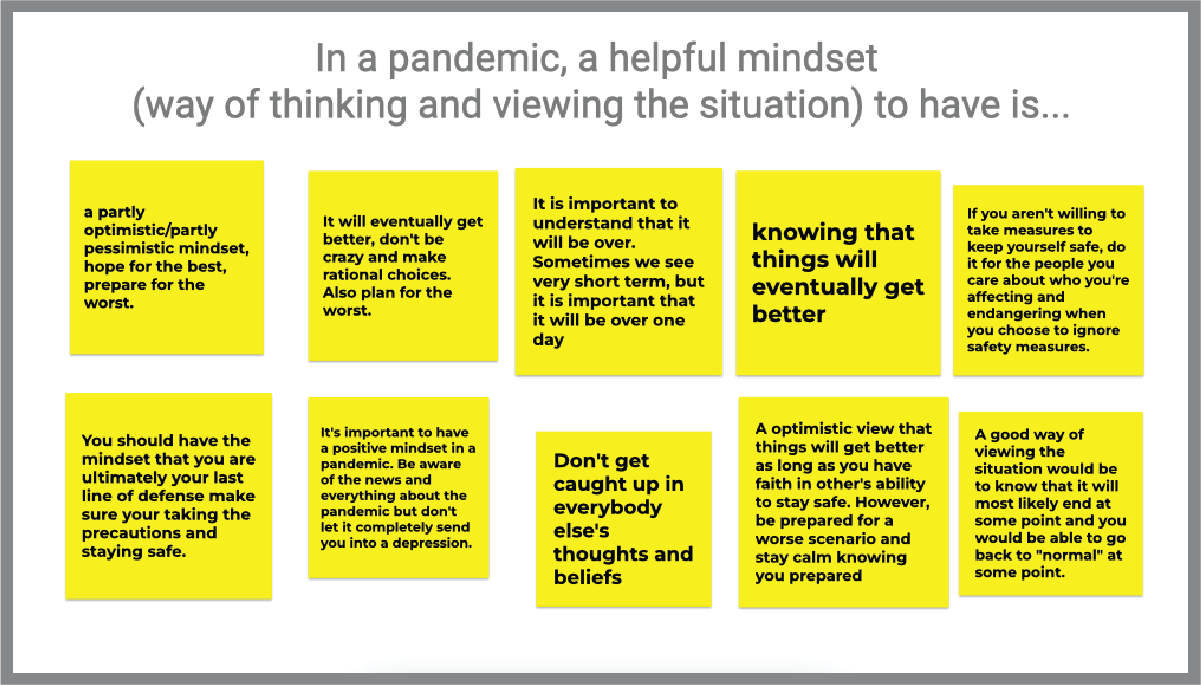
A snapshot of a Google Jamboard from an early co-design session held with teens virtually.
"Throughout this process, teens have been vulnerable, open, and generous in the sharing out of their ideas and wisdom. In their self-awareness, they've tapped into their firsthand experiences with hard topics to help make Disaster Mind relevant and responsive to their needs," shared Jane Lee, Senior Director of Operations and Mental Health at iThrive Games after our first co-design session in March 2022. "What they have contributed with their time, creativity, and retelling of their experiences navigating disruptions and shifts, has translated into a resonant resilience-building activity for their peers."
The themes and experiences teens shared with the design team and FEMA's emergency management specialists turned into actionable insights that informed Disaster Mind's content, ensuring the play experience we created was relevant, memorable, and responsive for teens.
MINDSET MATTERS IN DISASTER MIND
The work of disaster preparedness, response, and recovery is emotional. To convey this authentically and meaningfully in Disaster Mind, iThrive Sim—an award-winning platform that hosts single-player and multiplayer social and emotional skill-building simulations—was selected as the game's engine.
"iThrive Sim supports a 'learn by doing' approach where teens' emotions are ignited and used to support their active social and emotional skill-building," shares Dr. Susan Rivers, iThrive Games' Executive Director and Chief Scientist. "Each game offered via the platform is steered by teens' improvised interactions and real-time decisions, while the tech enables the modulation of stress and monitors in-game behaviors taken in response."


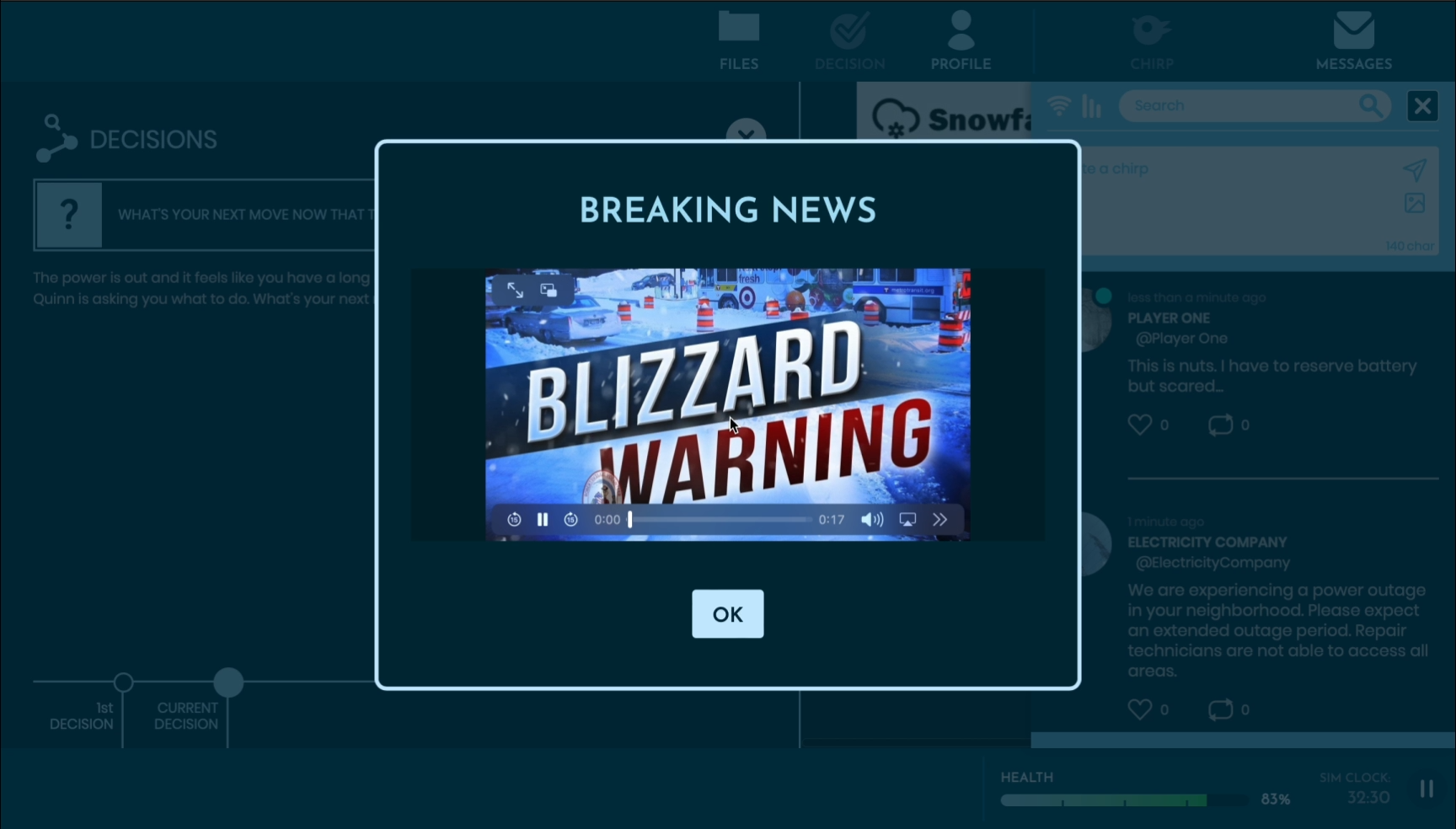
Screenshots of Disaster Mind, hosted exclusively on the iThrive Sim platform.
Using iThrive Sim's game mechanics, Disaster Mind invites players to practice social and emotional skills, like emotional regulation and responsible decision-making, while strategizing and solving their way through the game. By scaffolding this valuable skill-building with educational content meant to prepare teens for disasters, players grow familiar with the practices to lean on when complex emotions surface and the constructive mental pathways to call on when a natural disaster occurs.
Mindset matters as gameplay supports young people in being aware and actionable. Teens come to see through Disaster Mind's impactful play experience that underpinning the creation of a supply kit, or emergency go bag is an intentional mindset where one believes emergencies can happen to them and knows how to prepare.
'KNOW WHAT YOU PLAN TO DO': WHAT TEENS SAY ABOUT DISASTER MIND
True to our co-design process, teens across the country have been playing and testing Disaster Mind ahead of its launch later this year. Players reported feeling more confident in being able to prepare for an emergency and in managing the associated stress. Most report that they intend to talk to their family about an emergency preparedness plan, with many mentioning specific disasters, exit plans, emergency kits, and meeting locations.
After playtesting Disaster Mind, teens shared the following:
- "This game made me realize these types of disasters can really happen to anyone and you should always be prepared for the worst."
- "I think that it would be important in terms of cell service or other accidents to have a solid plan."
- "I now know to have a defined plan to be prepared if there were to be a natural disaster, especially if the family gets split, we should have a meeting spot."
- "Like it said in the game, you never know or never expect it to happen to you but it very well can."
- "I do intend on asking my parents if we do have a plan for if there were an earthquake. Living in an earthquake prone place, I realized that it is essential to have a plan with my family."
- "After [this] simulation, I feel like it is important to know what you plan to do."
The post-game reflections shared by young people attest to the power of the simulation. "Natural disasters are a challenge in today's world and will surely be one in the world teens and future generations will inherit," shares Stephanie Poore, the National Preparedness Branch Chief of FEMA Region 8." With Disaster Mind, our goal is to ensure teens are ready, aware, prepared, and practicing the skills that support their capacity when they strike."
New One Love Game Uses SEL to Help Young People Learn to Love Better
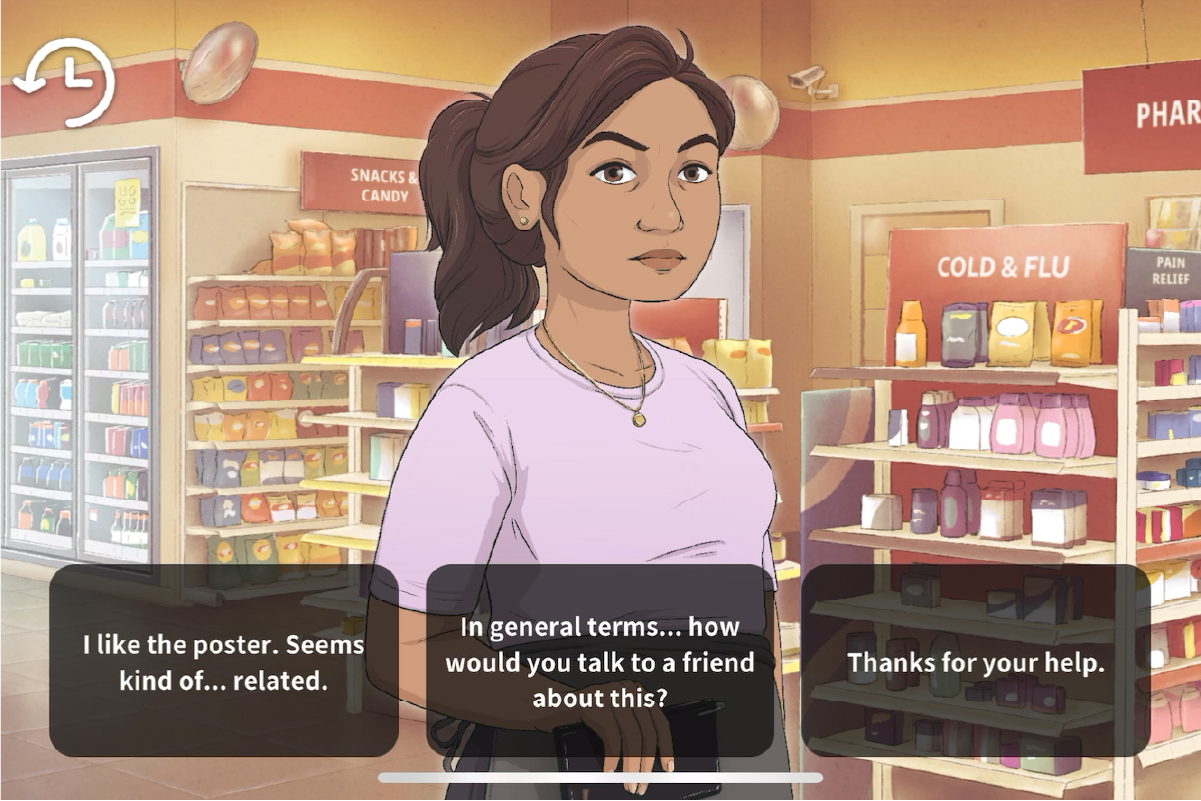
One in three young people will have an unhealthy relationship before reaching adulthood.
Interpersonal violence remains the third leading cause of adolescent death, contributing to one in every five teen suicides.
The need for more awareness-building and preventive interventions that help teens live full, safe, and healthy lives is unmistakable. Cadence Ford, a new mobile game made by the One Love Foundation in partnership with iThrive Games and Playmatics, LLC, responds to it with a safe and playful space for young people to familiarize themselves with unhealthy behaviors that may surface in relationships. As players interact with each story in the game, they are tasked with figuring out how to talk with their friends about uncomfortable issues and how to offer assistance in each of their unique circumstances. Through play, the game meets teens and young adults where they are to support their social and emotional learning and practice of constructive relationship skills.
"Cadence Ford builds on One Love's mission to bring life-saving prevention education to young people and expands on our honoring of Yeardley Love—a daughter, friend, and student-athlete whose life was tragically cut short by an ex-boyfriend in 2010 three weeks shy of graduating from the University in Virginia," shares Madeline Hopper, Senior Product Manager at the One Love Foundation. "Our goal with this game is to equip young people with the tools to love better, be with partners who practice healthy love, and advocate for healthy relationships. Because those tools are social and emotional, we were glad to have iThrive Games—experts in young people's social and emotional learning—be our partners throughout its development."
Our team joins One Love, and the teens and young adults who have played the game so far in hopes that Cadence Ford helps every person it reaches be aware, self-preserving, and better support systems for their friends in a world where antisocial interactions and unhealthy relationships are likely to be encountered. "We want all who play Cadence Ford to come to it with curiosity," shares Susan Rivers, Ph.D., iThrive's Executive Director and Chief Scientist. "And we want them to leave it empowered and better prepared to be ambassadors and practitioners of safe love and healthy communication."
MEANINGFUL GAMEPLAY, MEANINGFUL LEARNING
Cadence Ford sets forth a time-bending adventure in a charming town. Clocks have stopped, and the once-thriving community has fallen apart. The player must travel back to meet former friends, explore their stories, solve their mysteries, unearth past mistakes, and change the future before the present takes hold.
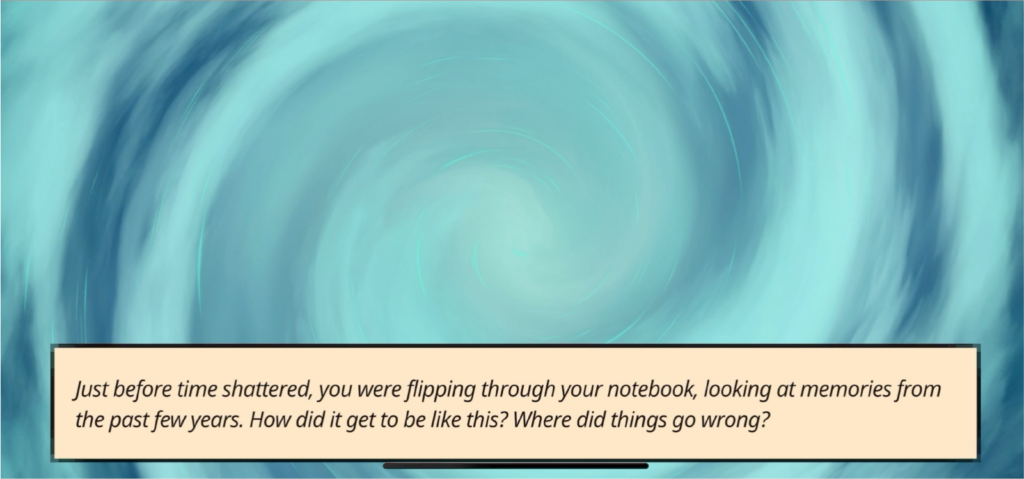
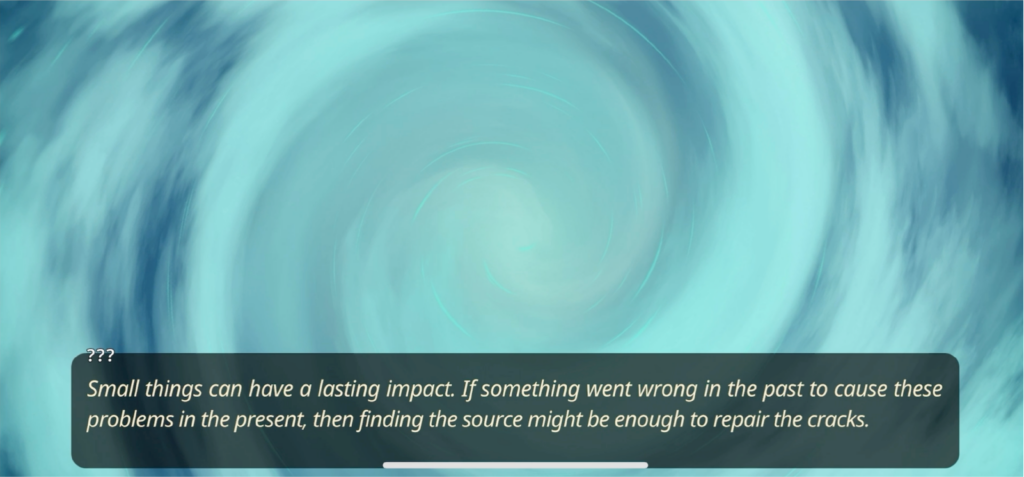
To do this, the player must make critical decisions throughout the game with how they communicate and interact with those past connections. Words must be chosen carefully since their friends' futures depend on it.
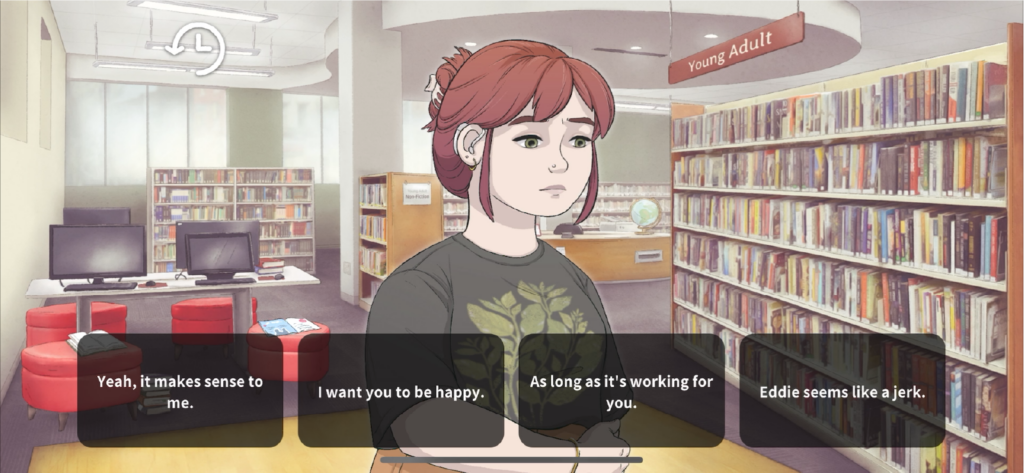
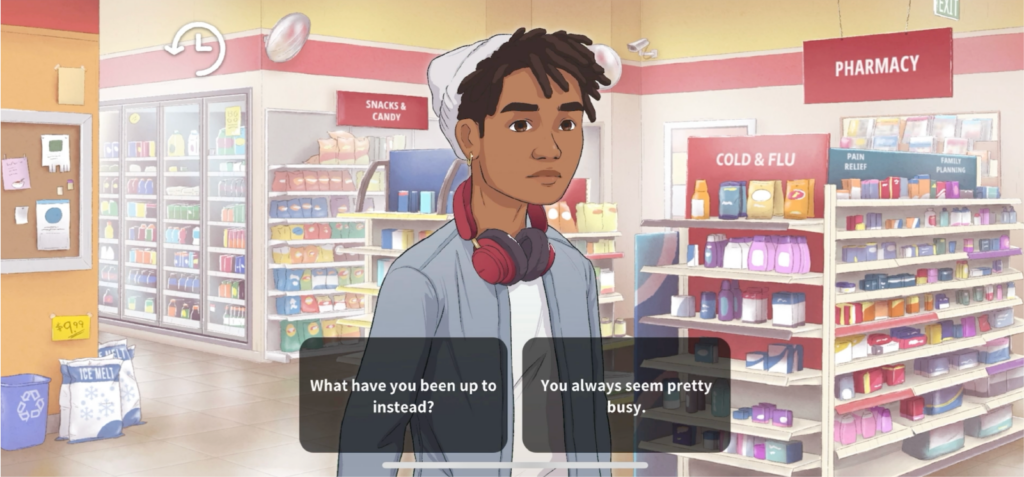
iThrive's teen social and emotional health expertise helped direct Cadence Ford's development cycle and supported the team's decision to make the game a text-based strategy one. In doing so, the play experience would build players' relationship skills by enabling their agency to make decisions and learn from them. "Games have always been microcosms of the real world, making them a springboard for exploring new ways of doing and being," shares Jane Lee, iThrive's Senior Director of Operations and Mental Health. "With Cadence Ford, we wanted to create a low-stakes, thought-provoking environment for young people to arrive at new understandings of who they are and the world around them. By making it a choice-filled offering, we offer young people a context to think expansively, arrive at learnings authentically, and fail safely."

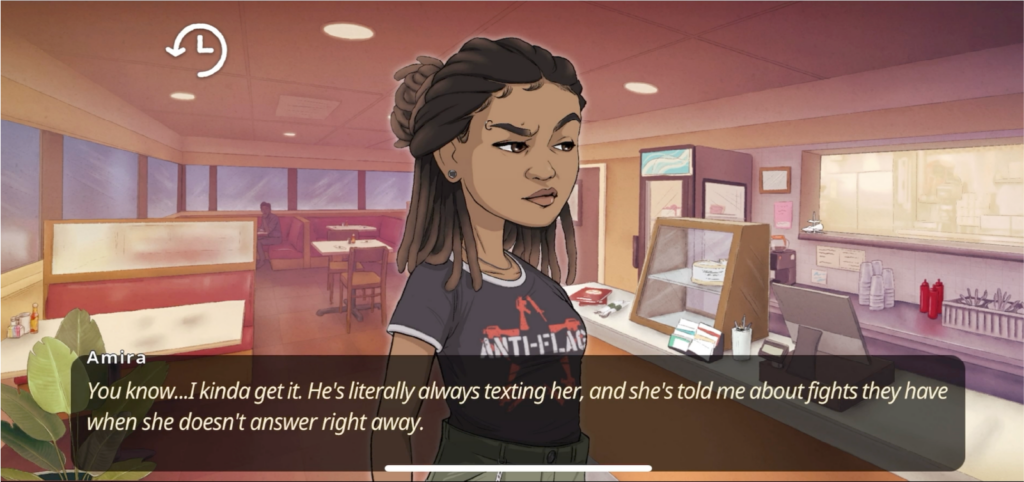
The game's mechanics assist players in navigating uneasy settings. Each of its interactive character stories helps sharpen the players' ability to listen actively, attend to conflict through productive communication, better understand restorative practices, recognize unhealthy behaviors, and uphold healthy ones.
Young people demand and deserve an ecosystem of care to do the social and emotional work that starts in early adolescence safely. Cadence Ford fits into that ecosystem by connecting them to this transformative social and emotional learning through play—a tool they're familiar with.
CO-DESIGNING STARTS WITH AND NOURISHES TEEN GENIUS
Beyond just using play as a lever for meaningful learning, the resonance of Cadence Ford is due mainly to its development alongside teens. iThrive's innovative co-design approach with young people was employed from the beginning to support us in folding in the wisdom of teens whose insights and feedback were integrated into the final play experience.
Everyone involved in the design and development of this game values the inquiry and imagination of young people. Teens and young adults in One Love and iThrive Games' networks were at the table from start to finish and developed their game design and social and emotional skills throughout the process.

Explore some of the activities that make up iThrive Games' Game Design Studio model here.
The Game Design Studio model at the heart of our co-design approach is a strengths-based one, and bringing it to the young people we co-created Cadence Ford with helped them uncover and share their thoughts. In co-design workshops, they shared perceptions on the importance of healthy relationships, defining what healthy and unhealthy signs of a relationship look like in their worlds and minds, and exploring with peers how to best navigate discomfort when it appears in the body and in peer relationships. Each of the co-designers and playtesters who lent their genius to Cadence Ford was compensated for their ingenuity as thought partners throughout this shared endeavor.
WHAT YOUNG PEOPLE SAY ABOUT CADENCE FORD
The play experience in Cadence Ford is yet another testament to the power of game-based learning. When young people who played the game for the first time were asked, "What did you learn about talking to friends in unhealthy relationships?" they shared responses that reflected their sharpened relationship skills and communication practices like "star[ing off small before jumping into the topic" and aiming to "understand their situation while encouraging healthy habits." Others shared that through the game, they "learned some new lines to help [themselves] and friends cope with relationship and friendship situations," "how to spot unhealthy behavior in a relationship," and "how to respond in situations where you see someone you know in these unhealthy relationships."
Like the many who have played the game and been a part of its making, we want Cadence Ford to assist young people in learning to be champions of healthy love and be with partners who practice it. "Yeardley's legacy of joy lives on in this game," shares Hopper. "At One Love, we work to change the statistics around relationship abuse one conversation at a time. With Cadence Ford, we're promoting that change one play session at a time."

